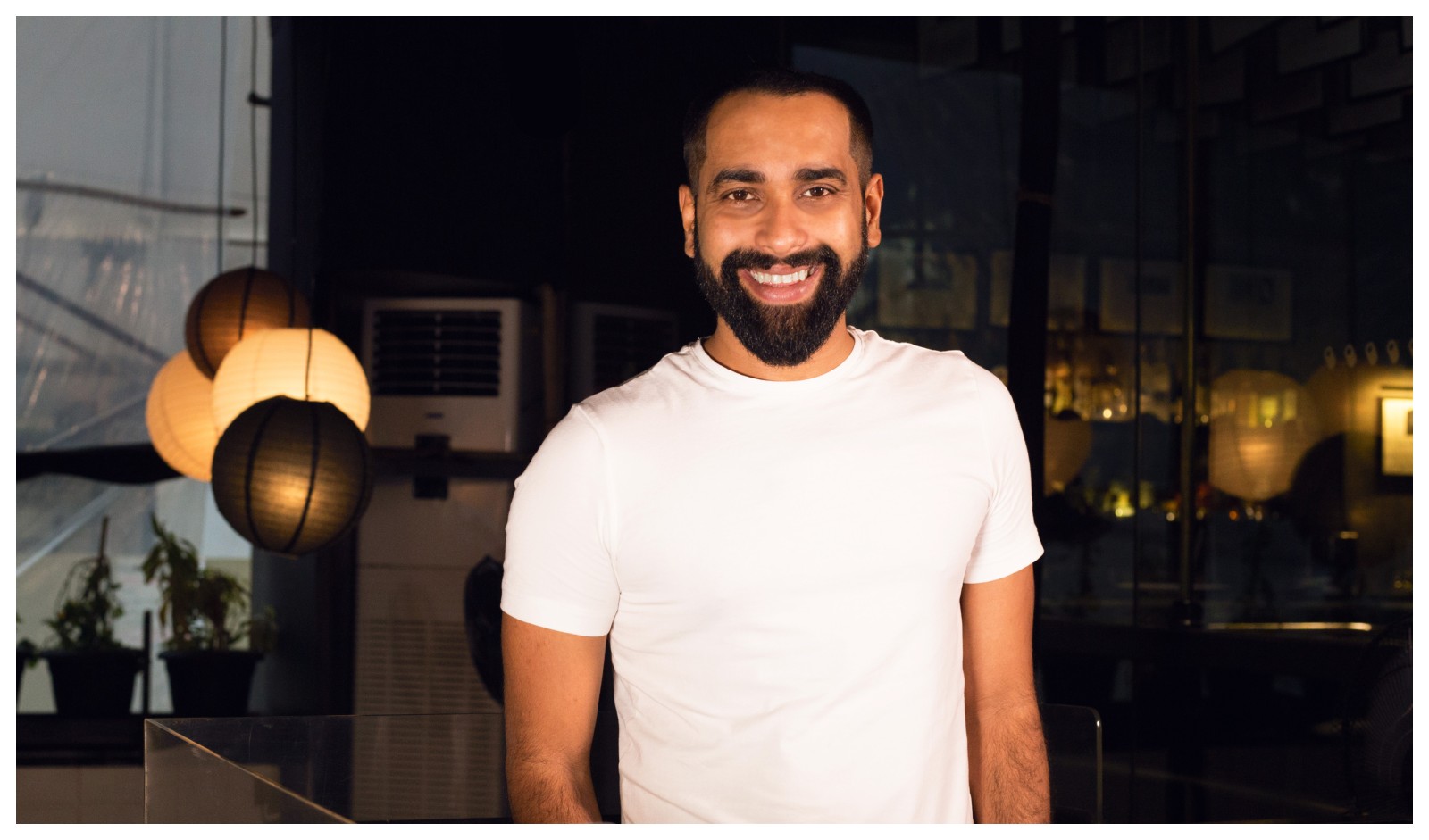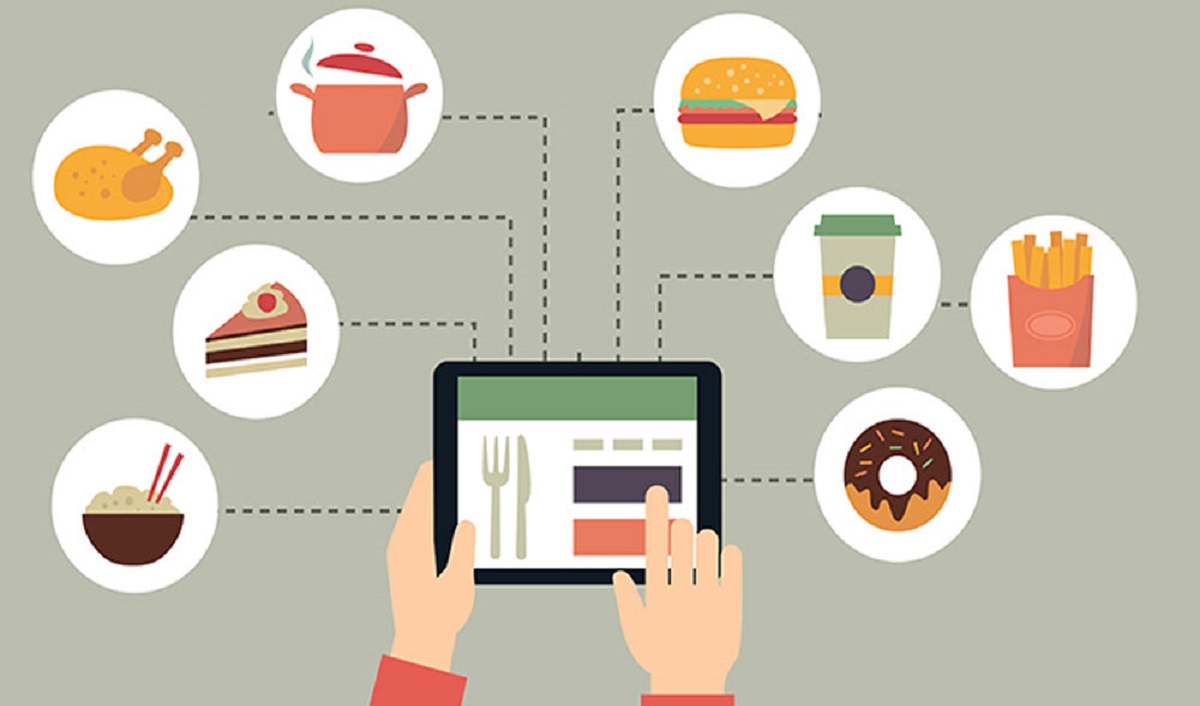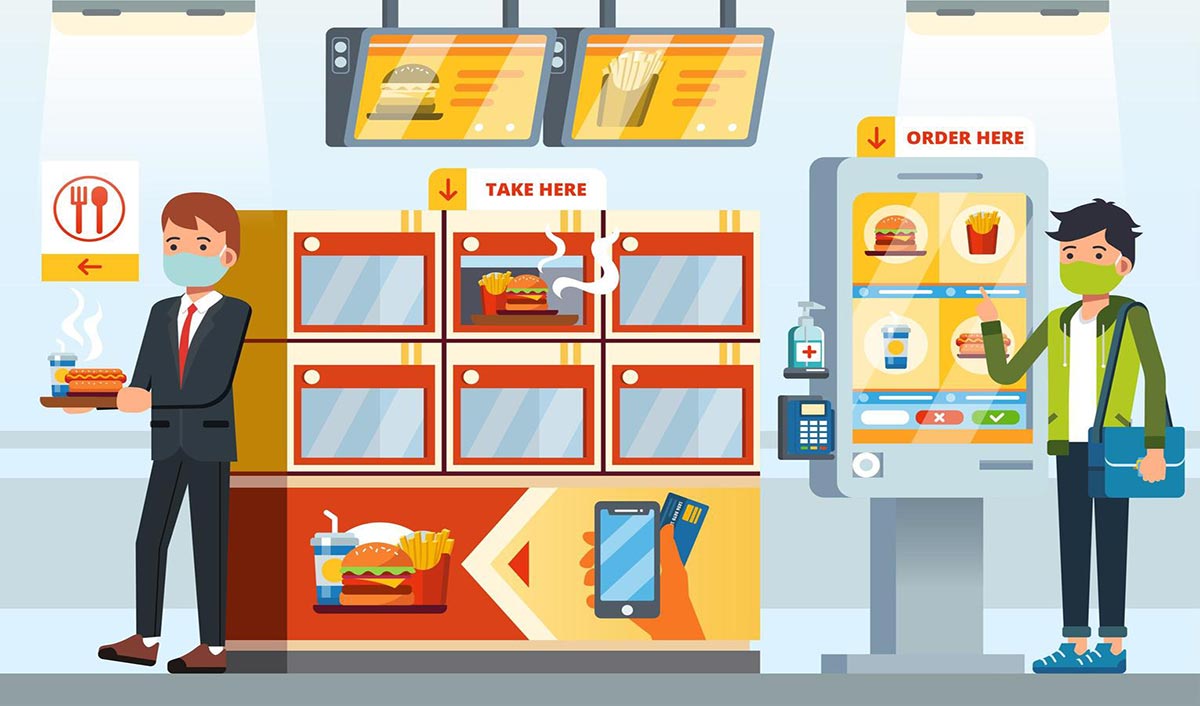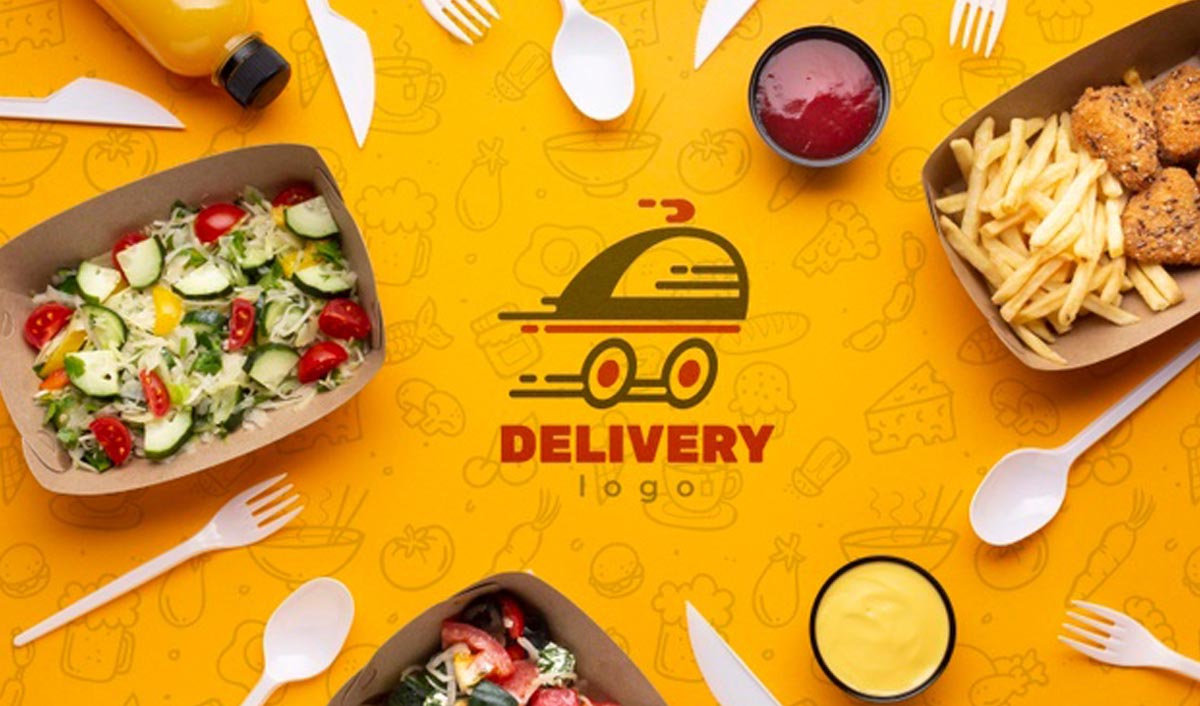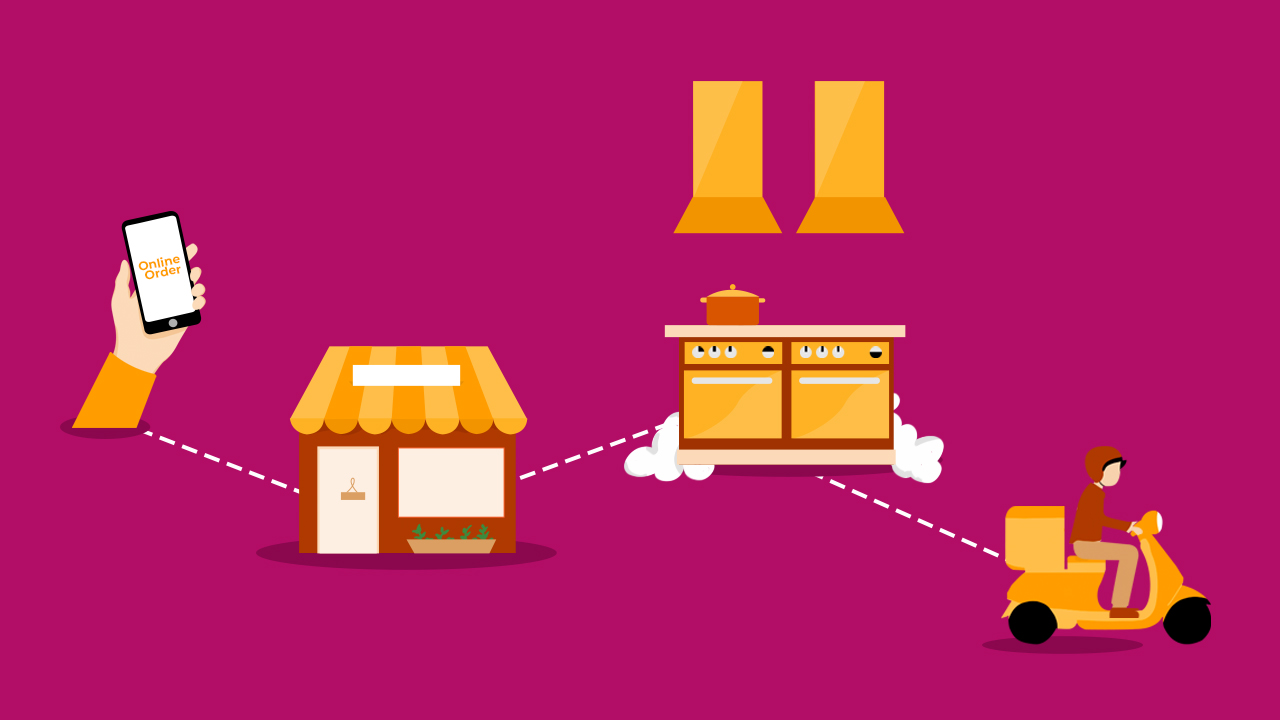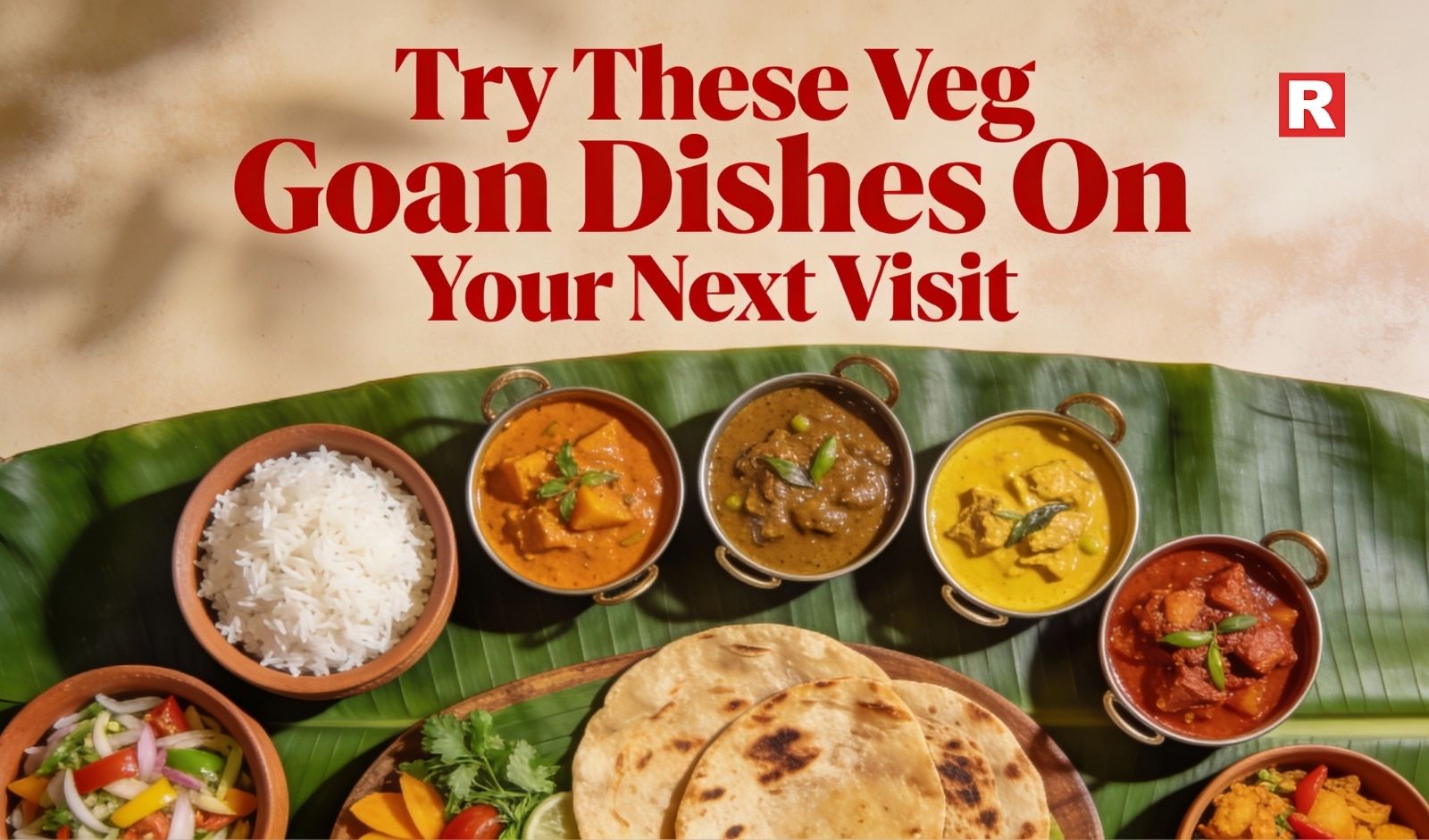
Year 2015 can be crowned as the shining period of food-tech start-ups in the country. From aggregators to subscription based model, fresh delivery business, healthy food sites and online booking to reservations sites, all saw great cash flows coming from the investors. But as 2016 is making its way ahead, the industry doesn’t seems to be doing good when it comes to continuing the same growth propaganda with which it was started.
The markdown of food-tech leader like Zomato could be topped as the downfall of food-tech business in India. However, this would not leave an earth shattering impact on the food-tech industry as the industry is already facing dearth of cash flows and business from quite some time. From merging two businesses to one, shutting the doors and vanishing from the scene, closing of business in expanded cities, these start-ups are facing blood bath.
Since, most of the food-tech players entering the business are thinking that the space could be a sure shot for them because food is one commodity which is never going to die in any country, few of them have worn out because of their greediness for short term expansion and quick moves.
Talking to experts, Restaurant India found that there are five major reasons that is creating a deficiency of growth in the fast evolving food-tech sector:
- Absence of experience: Started by a fresh graduate or somebody who is very young in the business, these start-ups lack the experience of quality judgement and decisions at times. According to the experts as most of the start-ups are co-founded by fresh IIT graduates thinking that food is alluring segment to enter.
- Quick on funding: With people either becoming an angle investor or an individual investor in a particular company, food-tech players have not really felt the heat of getting the cash flows. The model is ready, customers are coming in, investors are ready to fund, expansion is in process, but there is no scale in returns.
“I was approached earlier this week by the founder of a food delivery start-up who asked me if we were interested in participating in a funding round, after a potential investor removed their support. We declined,” Brett Stevens, Vice President, Jaarvis Accelerator shared.
- Ignoring the unit economics: experts in the industry have been talking about ‘UNIT ECONOMICS’ for long. Everybody knows that achieving unit economics in India is risky. Customers in the country are very experimental, they look for good quality food at minimal or value for money pricing. And, hence luring them with discounts and then burning their own pockets can be dangerous for these start-ups.
“Food tech has been seeing challenges including lack of new funding, failures and consolidation and more of that will continue. However, the primary challenge to me has been inability to scale and lack of focus on unit economics,” said, Ash Lilani, Cofounder and Managing Partner of Saama Capital.
- Loyal customers are a gift: Most of these start-ups are not trying to make a strong customer base, rather they are attracting new customers by some great deals and discounts which last for few days and they loose on their existence customer base. Instead, if they would work on making their first customer a loyal customer by serving him/her quality food, they would shine in the highly stiff market.
“Anything which is focusing on delivery alone is very difficult to make money because in India most deliveries are done for free because the restaurant is in particular radius and Indian customers are not ready to pay for delivery and it is a challenge,” expressed Hemendra Mathur of SEAF India citing that there is no future for food tech start ups in India. - Stop ‘Expanding’: As these start-ups have entered many cities without even having base kitchens, they are facing the heat of the industry. Expanding to regions that has small area could also add to their flat fall as most of people in such cities prefer to directly call a restaurant and order food, than to order it via such platforms. Hence, focusing on one city and then growing business in that region could be a game changer for the industry.
Adding his view on the ongoing scenario, Mohan Kumar, Partner at Norwest Venture Partners which has invested in Swiggy, pointed, “This (Zomato’s markdown) is not a reflection of food tech space, the opportunity is still there for a team with the right business model and ability to execute.”
Conclusion
And, hence we can say that most of these businesses that started presumed that the scale will become so large and half the target population will order through online or app, which is not happening. But the result is going in a backward direction where people today are ordering directly from restaurants and those who are ordering from app or their sites are only for discounts. And, once the discount is over the order rates goes down, so according to the experts in the industry food-tech expansion is the challenge and if one is not having gross margin of 50 per cent he/she is not going to make money. Even, if one is working on 15-20 per cent gross margin they are not going to make money. There is no future for such business.

Dishant Pritamani is a restaurateur driven by instinct and purpose, not convention. He founded The Daily Bar & Kitchen in Mumbai in 2013, creating a space that blurred the line between neighbourhood bar and cultural hub. Since then, he’s built a portfolio of distinct, experience-led venues from The Daily All Day and Tsuki in Pune to The Second House and Café Lento in Goa, each rooted in creativity, community, and conscious design. He plans to open Café Lento in Mumbai and Pune.
In an exclusive interview with RestaurantIndia, Dishant Pritamani, Founder of Luna Hospitality talks about his journey, AI-based restaurant, customer loyalty, sustainability and much more. Excerpts:
Handling Multi-Brand Venture
I believe work should bring joy and you can’t fake passion,” said Pritamani. “Each brand I’ve created reflects who I was at that point in my life. The goal is to stay authentic to myself and to the guests.”
When launching a new restaurant, he immerses himself in the process by spending over a year on-site to understand operations, team dynamics, and customer expectations. “I work alongside my team to ensure everything runs smoothly. Once they have been part of the journey from day one, they know how to carry it forward.”
While his brother oversees the Pune outlets, Pritamani continues to guide and visit each brand personally. “Being in the restaurants, facing a guest that’s where I find my happiness. If you empower people, you will be shocked to know what they can hold on.”
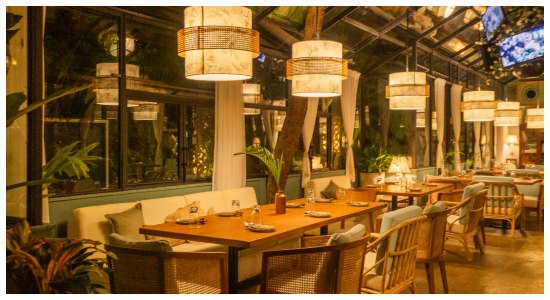
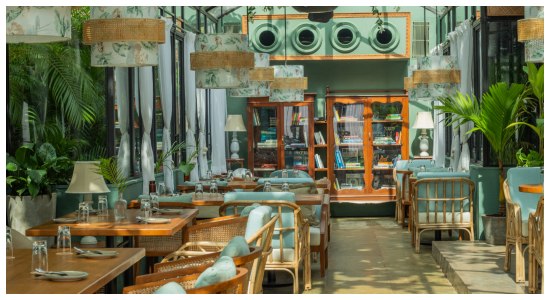
The Foreseen Challenges
We started with 12 core team members who’ve been with me since the beginning. When we expanded The Daily to Pune, six of them moved there - a decision that made all the difference.
While many chase rapid growth, I focused on growing steadily, which helped us build a stronger brand with a stable, committed team. Most of my senior and middle management have been with us for years, and that continuity shows in everything we do.
Identifying Locations
For me, it’s all about understanding the consumers, their preferences, spending habits and what concept fits the location. Before opening The Second House in Goa, I spent nearly a year living there and researching every detail.
The site we chose was offbeat, and many advised against it, but we saw its potential. The lower rent allowed us to invest more in design and technology, turning the space into a unique strength rather than a challenge. I believe every restaurant should have its own distinct identity, shaped by its surroundings and audience.


The AI Designed Restaurant
For The Second House, Pritamani reunited with Ayaz Basrai of Busride Design Studio, who had earlier designed The Daily All Day in Mumbai, a decade ago.
Basrai, who has designed and teaches “AI Meets Design” across colleges, turned this project into a real-world example of how artificial intelligence can reshape architecture. The team researched the property’s history by studying who lived there and poring over vintage photo albums from 60–80 years ago. Using AI, they extracted architectural details from old images to precisely recreate elements like pillars and facades from the 1940s.
Even the lighting at The Second House was custom designed through AI, refined with multiple prompts to achieve the perfect look. The team is now developing a light-and-smoke installation, set to launch by January 2026, where warm air will suspend smoke at chest level - an experimental fusion of design, technology, and science that defines The Second House’s futuristic spirit.
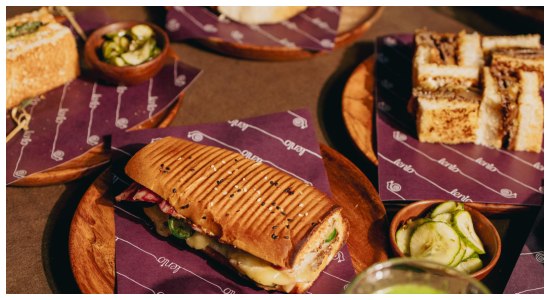

Interiors & Ambience
When launching a restaurant or café, it’s crucial to have a clear concept that ties together the brand name, menu, interiors, and consumer experience. A well-defined vision ensures long-term relevance, with interiors playing a key role in drawing audiences.
For example, at Café Lento Goa, the design celebrates nature as we are growing trees inside the space instead of cutting them down. The name Lento, meaning “slow” in Portuguese, reflects the idea of slowing down with nature. The next Café Lento will open in Koregaon Park, Pune, where each outlet will have a unique design interpretation by the designer.
Meanwhile, Tsuki, our Pan-Asian Japanese restaurant in Pune, operates on a solar-powered, self-sustained terrace. Rather than following trends, our goal is to set examples combining creativity, sustainability, and thoughtful design.
Nurture Creativity & Innovation in Staff
Allow them to make mistakes, as long as the mistake is new, correct it. If the mistake happens again, be stern and not mean. Involve them in processes so they will understand about the work. Be open to learning from everyone. Appreciating staffs works.
The Sustainability Factor
Chef Jyoti, Culinary Director tells the team to use the skin of fruits and veggies in various items. For Eg: We are using watermelon skin in cocktails/mocktails. We have a small farm outside The Second House, Goa from where we use veggies and fruits for cooking.
In Goa, where water scarcity is common, we have built small but meaningful water conservation systems at The Second House. We recharge our onsite well with rainwater, use purification processes to ensure sustainability and even created a glasshouse water tank that stores purified rainwater. During shortages, this stored water supports our operations making the restaurant both eco-conscious and self-sufficient.
Dining is Growing
Experiential dining is increasing a lot and that people are shifting more towards dine-in.
“We are more focused on dine-in than deliveries. After Covid, people are coming back to experience the dining, and restaurants are making their mark by ensuring that customers keep coming back. It’s all about giving the customers unique lasting experiences which stays for long run.”
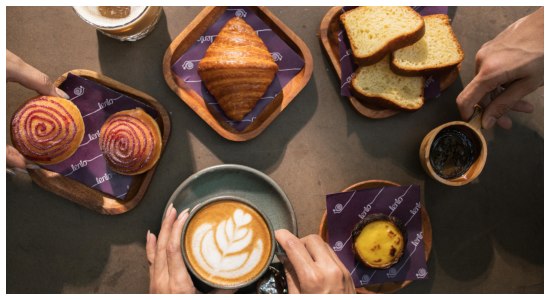

Menu Development for Each Brands
New menu is not trending base for us. At Lento, Chef is planning to re-image Besan Chilla. “We are working on things that give us nostalgia. We want people to enjoy the comfort food in a unique way. We are using AI to push flavor combination that doesn’t come to the Indian minds. And we are trying the combinations to ensure which flavor-combos work."

Customer Loyalty
Don’t let your staff keep changing. If a person feels welcome, they will keep coming and be your regular customer or a loyal customer. Customer retention comes from employee retention.
Message for New Restauranteurs
Do for right reasons. It’s not easy if you aren’t crazy. If you don’t take risk, so you will never know.

During peak seasons, AI plays a vital role in streamlining operations and enhancing safety. AI in food safety with predictive analysis helps reduce contamination risks, protecting both consumer health and the brand’s reputation. It also improves efficiency by accurately forecasting demand, which prevents over-ordering and cuts down on food waste benefiting both the business and the environment. Let’s see how AI helps the brands to enhance themselves.
The Peak Season Pressure: Why Food Safety Risks Multiply
Peak seasons always test the limits of brand’s operations from sourcing and storage to kitchen efficiency.
Commenting on this, Hardik Shah, Chief Technology Officer, Impresario Entertainment & Hospitality Pvt. Ltd said, “We use tools that are helping us plan better rather than just react. Even simple pattern recognition like understanding consumption trends or monitoring temperature consistency goes a long way in maintaining food safety.”
The brand is also using data to get more visibility into what’s happening in real time and where potential risks could arise. “It’s less about replacing human judgment and more about giving our teams the right insights at the right time,” he added.
It also helps in improved consumer safety, lower operational costs, quicker decision-making, and stronger compliance.
Significant Impact from AI
AI tools have automated menu digitization and onboarding, enabling restaurants to go live faster, facilitate real-time order matching with delivery partners, and recognize demand patterns for strategic pricing and promotional purposes.
Referring to this, Anirudha Kotgire, Managing Director & Co-Founder of Waayu mentioned, “We utilize AI for faster onboarding, more efficient order matching, and insights that enhance restaurant margins. Waayu enhances restaurant profitability with lower operational overhead, reduced food waste, quicker revenue capture, and higher average order value, all while safeguarding restaurants’ control over pricing and customer data on Waayu’s zero-commission ONDC-native platform.”
Monitoring Real-Time Data
AI supports regulatory compliance by providing real-time, data-backed proof of safety measures and continuously monitoring critical control points. This gives brands and food outlets the confidence to handle peak production periods while maintaining quality, consistency, and cost-effectiveness.
Sharing further, Kotgire noted, “Waayu empowers restaurants to observe order status, kitchen load, and order execution in real time via POS, new POS functionality, and delivery telemetry.”
The quality of service is not affected because the immediate visibility and alerts reduce order delays and cancellations; as a result, customer satisfaction will remain high. Automated quality checks and smart resource allocation help businesses respond faster and more efficiently.
Focus on sustainable operations
AI also supports sustainability by minimizing waste, reducing energy use, promoting traceability, and encouraging circular economy practices and eco-friendly packaging. It’s not just about efficiency; it’s about building responsible, future-ready operations.
Chef Vijay S Sahu, Chef de Cuisine, Courtyard by Marriott Mumbai International Airport added, “AI can help detect potential issues early, provide end-to-end supply chain transparency, and improve traceability. With real-time monitoring, businesses can forecast demand and spoilage more accurately, order ingredients in the right quantities, adjust production schedules, and quickly identify any batches at risk.”
By analyzing supplier histories, delivery patterns, and ingredient shelf life, AI systems can flag batches that have a higher risk of contamination. For example, if a supplier has had previous cold chain issues or delayed deliveries, the AI can recommend closer inspection or alternate sourcing.
The Foreseen Challenges
A key challenge is the heavy reliance on large amounts of data. If the data is limited or inconsistent, AI models may be inaccurate. There’s also a lack of standardization on how data is collected, along with high costs and complex systems, which can make it difficult for smaller food businesses to adopt.
The challenge, of course, is balancing technology with the human element that hospitality thrives on. Shah mentions, “For us, it’s about using tech quietly in the background so that operations feel smoother, safer, and more consistent.”
Commenting on this, Agilesh R, Director F&B, Sheraton Grand Chennai Resort & Spa shared, “While challenges like data integration, high setup costs, and staff resistance exist, they can be overcome through clean data practices, employee training, pilot projects, scalable cloud platforms, and robust cybersecurity.”
The big opportunity lies in shifting from a reactive to a proactive approach. This helps reduce overproduction and food waste, lowering environmental impact while supporting the company’s sustainability goals all with the assurance of strong food safety standards.

Dining today has moved far beyond just taste. It has become a full experience. Across the world, chefs and restaurants are changing the way people eat. They are mixing science, design, and technology to turn a meal into something more. This new style of eating is called immersive or multi‑sensory dining.
In this type of dining, every sense plays a role. The smell of the room, the sound of music, the colours on the plate and even the feel of the table matter. Diners do not just taste food. They see it, hear it, smell it, and touch it before the first bite. Restaurants use light, sound, and scent to build a mood. They use visuals and music to tell a story. Some even use VR or AR to create a place around the food. This way of dining makes a meal personal. It makes people remember not just the dish but the moment. It is food as an experience, and it is becoming a global trend.
Read more: 7 Types of Whiskies Everyone Should Try Once
How Cloud Kitchens are Disrupting the Indian Restaurant Industry
What is Neuro‑Gastronomy?
Neuro‑gastronomy is the study of how our brain understands taste. It explains why food tastes different when you hear music, see certain colors, or even smell something in the air. Our brain mixes information from the eyes, ears, nose, and skin before deciding how food tastes.
For example, a simple dessert can taste sweeter if soft, high‑pitched music is playing. The same dessert can taste less sweet if heavy, low music is used. This is the science behind immersive dining.
The Rise of Multi‑Sensory Dining
A Worldchefs report shows that dining experiences using all five senses have been growing since the 2010s. People no longer want only good food. They want something special that feels personal.
Gen‑Z and millennials are driving this trend. They are looking for new experiences when they eat out. They like to share these moments on social media. For them, a meal is a memory, not just a plate of food.
Know more: Top 7 Food Safety Practices Every Restaurant Should Follow
How Technology Creates These Experiences
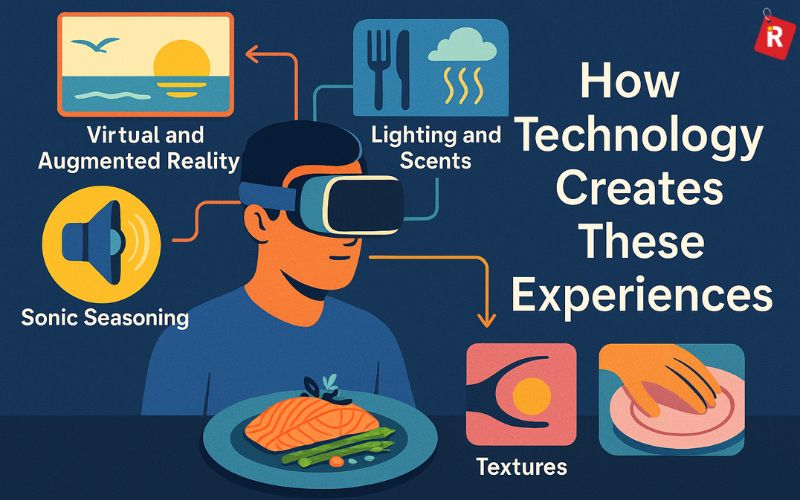
Technology has become an important part of immersive dining. Many restaurants now use modern tools to make a meal feel like an experience. They bring together sight, sound and smell to make food memorable. This mix of food and technology can be explained in four simple ways:
- Virtual and Augmented Reality: Restaurants use VR and AR to change what people see and hear while they eat. A headset can make a person feel like they are sitting by the sea while enjoying seafood. AR can project moving images on a table to turn a meal into a story.
- Sonic Seasoning: Chefs use sound to guide taste. High‑pitched music can make a dish taste sweeter. Low sounds can make flavours seem deeper and stronger.
- Lighting and Scents: Lights in a room change mood. Soft smells in the air can make a meal more pleasant.
- Textures: Even the feel of the table or plate changes how food is enjoyed.
Why Restaurants Are Adopting This
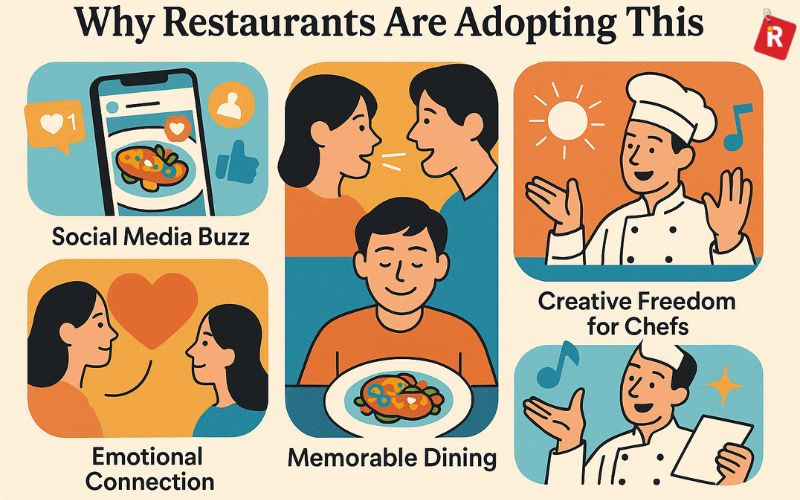
Restaurants that bring immersive dining to guests are different from regular places. These experiences make people curious and excited. They also help restaurants create a strong image. The impact of such dining can be seen in five simple ways:
- Word of Mouth: Guests talk about these places. They share their experience with friends and family. This makes the restaurant popular without extra effort.
- Social Media Buzz: People post photos and videos of these special meals. Every post acts like free publicity. It attracts more people who want to try the same experience.
- Memorable Dining: A unique dining experience stays in the mind. Guests remember not only the food but also the moment. It makes them want to return.
- Emotional Connection: This type of dining builds a bond between the guest and the restaurant. Guests feel connected to the place because of the personal experience.
- Creative Freedom for Chefs: For chefs, this is more than cooking. It gives them a chance to tell a story through food. They can use sound, light and design to express ideas. This makes their work more creative and exciting.
Also check: Best Theme Idea for a Rooftop Restaurant: A Starlit Bohemian Escape
Oats vs. Muesli: Which Breakfast Option Is Better For Weight Loss?
12 Delicious High-Protein Foods to Eat Daily for a Healthier You
Examples Around the World
Some restaurants are already leading this trend. Ultraviolet in Shanghai is one of the first to create a complete sensory dining experience. Guests sit in a private room surrounded by lights, music, and visuals. Every course has its own scene.
In Europe, there are pop‑up dinners where VR headsets take diners to a forest or under the sea while they enjoy food inspired by those places. In India, some luxury restaurants have started adding music, lights, and scents to their meals to make the experience more special. This is still new but growing fast.
The Future of Dining
Immersive dining is growing quickly and will continue to grow in the coming years. Many restaurants are now looking for ways to make every meal feel like an event. In the future, this experience may become even more personal. New systems may be able to choose music, colours and scents to match the taste and mood of every guest.
Dining is no longer just about food on a plate. It has started to feel like a journey. Guests are taken through scenes and moments while they enjoy a meal. Each dish becomes part of a story. For diners, this makes eating out more special. It changes a simple dinner into an event they can remember. For restaurants, it offers a way to stand out. This style of dining is set to shape the future of the food industry worldwide.
Closing Thought
The next time a person steps into a restaurant, there is a new question to think about. Do they only want to eat? Or do they want more than that? Today, food can be more than just taste. It can be an experience. Guests can see, hear, smell, and feel their food before the first bite. The colours, the music, the lights, and even the air around the table change how food feels.
Many restaurants have already started to bring this new way of dining to life. They want guests to enjoy every moment. It is no longer just a plate on a table. It is a full story told through food. This is the future of dining. And it has already begun to change how people enjoy a meal.

The Waffle Co., India’s first dedicated waffle brand launches their official mobile application, The Waffle Co. App, now available on both the Google Play Store and Apple App Store. This marks a significant milestone in the brand’s journey, offering customers a more seamless and rewarding way to connect with The Waffle Co. through its exclusive loyalty program, The Waffle Lovers’ Club.
With the launch of its new app, The Waffle Co. introduces a delightful experience where customers earn 7% back in points on every purchase—each point worth ₹1. These points can be redeemed at any of the brand’s outlets across India, turning every waffle into an opportunity for more.
New users enjoy a warm welcome with 50% off (up to ₹100) on their first order via the app. Members also receive exclusive birthday and anniversary rewards. Best of all, the loyalty points never expire—making it easier than ever to indulge in your favorites, on your terms.
Speaking about the launch, Amar Preet Singh, Co-founder of The Waffle Co. said, “With the launch of The Waffle Co. App and The Waffle Lovers’ Club, we’re taking a significant step forward in how we connect with our customers. We’ve always been committed to delivering not just high-quality waffles, but memorable experiences. This app allows us to reward loyalty in a meaningful way, while also creating opportunities to learn more about our customers’ preferences and personalize our offerings accordingly.”
This initiative positions The Waffle Co. as India’s first waffle brand to introduce a dedicated mobile app with an integrated rewards program, setting a new benchmark in the dessert café segment. It also reflects the brand’s strategic move towards digital transformation, with customer data and analytics playing a vital role in future marketing and engagement plans.
“The launch of our mobile app is a reflection of our commitment to evolving with our customers’ needs. As we scale, it’s essential to stay ahead in how we deliver convenience and value. This app not only rewards loyalty but also strengthens our direct relationship with our patrons making their Waffle Co. experience smoother, smarter, and more satisfying than ever before.” adds Anand Preet Singh, Co-founder of The Waffle Co.
Customers can download The Waffle Co. App by scanning the QR code available in stores or sharing the download link with friends and family. With this launch, The Waffle Co. invites all foodies and waffle lovers to join The Waffle Lovers’ Club and start earning sweet rewards from their very first bite.

Managing a restaurant kitchen is one of the toughest jobs in the business. Orders pour in quickly, staff have to balance several tasks at once, and even a small mistake can lead to wasted food, unhappy customers, and lost revenue. In such a fast-paced environment, staying organized and efficient is essential. That’s where a Kitchen Display System (KDS) comes in.
A KDS helps replace paper tickets and reduces confusion by displaying orders clearly for the entire team to see. It keeps the workflow steady and improves communication between the front and back of the house. But just installing a KDS isn’t enough anymore. To keep up with growing competition and rising customer expectations, even the best systems need to evolve. With the help of modern technologies, restaurants can make their KDS smarter, faster, and more reliable. Here are four practical technologies that can turn a hectic kitchen into a smooth, well-coordinated operation — and help deliver better service that keeps guests coming back.
Read more: Top 7 Food Safety Practices Every Restaurant Should Follow
Mastering the Art of Roasting: Techniques Every Restaurant Chef Should
Why Your Kitchen Needs a Tech Makeover
A KDS is more than just a digital screen that shows orders. It is the heart of your kitchen’s workflow. But many restaurants still use outdated systems or manual processes. This slows down service, confuses staff, and increases errors.
Studies show that restaurants using advanced kitchen technologies reduce ticket times by up to 30%. They also improve order accuracy, cut food waste, and make kitchens less stressful for staff. If you want your kitchen to run like a well-oiled machine, it’s time to embrace these technologies.
Find 4 Technologies to Spice Up Your Kitchen Display System
Below are four proven technologies that integrate with your KDS and improve how your kitchen operates.
1. Cloud-Based KDS Solutions

A cloud-based Kitchen Display System (KDS) securely stores all kitchen data on remote servers instead of relying only on a local device. This setup allows restaurant owners and managers to access critical information anytime and from anywhere — whether they are visiting another branch, working from home, or traveling. Unlike traditional systems that can fail if the device crashes, a cloud-based KDS keeps data safe and backed up, reducing the risk of loss. It also makes it easier to update menus, monitor kitchen performance, and track orders across multiple locations in real time. This flexibility and reliability help restaurants maintain control over operations, even when they are not physically present in the kitchen
With cloud-based systems, you can:
- Monitor orders in real time across all outlets.
- Make updates to menus instantly.
- See detailed reports about performance and sales trends.
2. IoT-Enabled Kitchen Equipment

The Internet of Things (IoT) introduces smart, connected equipment into the restaurant kitchen. With IoT, devices like ovens, fryers, and refrigerators can communicate directly with the Kitchen Display System (KDS), creating a more efficient workflow. For example, an oven can notify the KDS when a dish is cooked, or a fryer can adjust its temperature and time based on the order details received. Sensors in refrigerators can also track and report temperature, helping maintain food safety standards. This seamless interaction between equipment and the KDS reduces errors, saves time, and ensures consistency in preparation. By integrating IoT, a kitchen becomes more responsive and better prepared to handle busy service hours.
Here’s how it helps:
- Ovens can notify the KDS when a dish is ready.
- Sensors track temperatures to avoid overcooking or spoiling.
- Fryers adjust cooking times based on the order size.
Know more: Everything You Need to Know About Soft Openings for Restaurants
3. AI-Powered Predictive Analytics

Analyzing order history allows restaurants to work more intelligently and efficiently. By studying patterns over time, technology can predict peak hours, helping staff prepare in advance for busy periods. It can also recommend the best times to start cooking specific dishes so they are ready exactly when needed, avoiding delays or cold plates. These insights help managers schedule staff more effectively, stock ingredients in the right quantities, and reduce waste. Such data-driven decisions not only improve the kitchen’s speed and accuracy but also ease the pressure on staff during rush hours. With these predictive tools, a restaurant can deliver faster, more consistent service while keeping both customers and employees satisfied.
Benefits include:
- Faster prep during peak hours.
- Better inventory management.
- Improved staff scheduling.
4. Voice-Activated Command Systems

In a busy kitchen, where hands are often occupied, a voice-activated Kitchen Display System (KDS) offers a practical solution. Cooks and servers can speak commands aloud, and the system responds instantly, eliminating the need to touch a screen or press buttons. This hands-free operation is especially valuable during peak hours when every second counts. It also promotes better hygiene, as staff don’t have to handle the screen with food-covered or wet hands. Voice commands make it easier to move through tasks quickly and keep the workflow uninterrupted. For kitchens looking to improve both efficiency and cleanliness, a voice-activated KDS brings noticeable improvements to daily operations and staff productivity.
For example:
- “Show next ticket” displays the next order.
- “Mark order complete” updates the system hands-free.
Also check: What Is an Angel Shot? Everything You Need to Know (and Why It’s MoreThan Just a Drink)
Don’t Let Your Tickets Burn—Why Speed Matters
Every minute matters in a kitchen. When orders get delayed, it not only frustrates customers but also adds stress to the team. The right technology helps keep things moving, preventing tickets from piling up and ensuring smooth, fast service. A busy kitchen often feels like chaos, but with smart tools, it starts to feel more like a well-coordinated team, where every station works in sync. Mistakes become fewer, the shouting quiets down, and the staff feels more at ease. Voice-activated systems aren’t just a clever feature — they’re genuinely useful. They let chefs and servers keep their focus on cooking and plating, without wasting time tapping screens or searching through menus. These changes make the kitchen a calmer, more efficient place to work.
Check more: What Is Restaurant Profit Margin And How To Improve It? Your Ultimate Guide
How Bars & Restaurants Can Protect Themselves Amid Heightened Violence
Data is the Secret Sauce
The power of data in a restaurant kitchen cannot be underestimated. Analytics provides clear insights into operations, helping owners and managers identify what’s working and where improvements are needed. By examining patterns and numbers, restaurants can streamline their workflow and enhance the customer experience.
- Track Popular Dishes: Detailed reports highlight which menu items sell the most, allowing chefs to focus on what customers truly enjoy and adjust the menu accordingly.
- Monitor Peak Hours: Analytics reveals the busiest times of day or week, enabling managers to schedule staff efficiently and prepare the kitchen for high demand.
- Reduce Waste: By understanding trends and demand, restaurants can better manage inventory, order the right quantities, and minimize food waste.
With the right data in hand, restaurant kitchens make smarter decisions that save money and deliver better service.
Final Thoughts
The kitchen is the heart of every restaurant, keeping the entire operation alive and thriving. Like any heart, it needs proper care and the right tools to stay strong and efficient. Upgrading the kitchen display system (KDS) with modern technologies such as cloud-based solutions, IoT-enabled equipment, predictive analytics, and voice commands can completely transform how a kitchen performs. These innovations help improve speed, accuracy, and coordination, allowing staff to work more confidently and serve customers better. In a competitive restaurant business, every advantage counts, and these tools provide just that — an edge to stand out. For any restaurant that aims to deliver quicker, smarter, and more reliable service, investing in these technologies is not just an option but a necessity for long-term success.

India is currently witnessing a tremendous boom in restaurant segment. With this rapid expansion, comes several industry-wide challenges. From staffing and training to supply chain inefficiencies and the ever-evolving preferences of today’s diner. So, navigating operational challenges is no small feat—at every step, there’s a challenge waiting for you.
The Indian restaurant industry is currently valued at 85.19 billion dollars in 2025, and it is reported to grow at a compound rate of 15%. This shows that market is set to grow, so let’s focus on the key operational challenges.
Changing Customer Preferences
Customer preferences are also evolving. People want healthier options; more transparency, convenience, and a seamless experience across dine-in, delivery, and digital platforms.
Lalitha Dutta, Managing Partner, Firewater Neo Kitchen & Bar, Hyderabad said, “Restaurants need to stay on their feet—updating menus, experimenting with formats, and being present across platforms. At the same time, basics like cleanliness, food safety, and handling feedback well are non-negotiables.
Commenting on the same, Hanumanth Rao Naineni, Founder, Roast Café, Hyderabad shared, “To stay aligned with evolving consumer preferences, we’ve expanded our menu across cuisines and dietary needs - but without losing focus. Our kitchens are structured with dedicated sections for each cuisine, led by chefs who bring both discipline and expertise.”
However, for AB Gupta, Co-Founder, Smash Guys, these are all because of the fast-evolving customer need, health-conscious eating, sustainability, digital convenience - demanding constant reinvention etc.
Staffing & Managing Labor costs
One of the biggest hurdles is staffing. It’s difficult to find skilled workers, and once they are molded to the restaurant liking, keeping them motivated and managing labor costs without compromising on service are the next set of challenges.
“We’ve chosen to face these challenges head-on by investing deeply in our people, processes, and product. For staffing and training, we bring in talent from the most respected establishments, as well as trainers who align with the growth story we’re building,” added Naineni.
With high attrition rates and rising wage expectations, building and retaining a reliable team is harder than ever.
Hurdles in Inventory & Supply-chain
Inventory and supply are the biggest challenges one has to face on ground. Whether its delays, inconsistent quality, or rising costs, sourcing reliable ingredients consistently is tough. “On the supply chain front, we’ve built a robust and sustainable backend through Halcyon, an F&B supply company I personally partner with. This ensures our systems are in place well before an outlet opens, allowing growth to be seamless and supported,” highlighted Rao.
While, Gupta said, “When you work with fresh ingredients and prep everything from scratch, even minor disruptions can impact the entire service. We’ve learned to work closely with suppliers, forecast demand better, and stay agile - especially when availability becomes unpredictable.”
Maintaining Relationships
Building strong relationships with trusted suppliers becomes essential. While, providing customer satisfaction play a major role in boosting the relationships. This helps in gaining profit margins and building the loyal set of customers helps in the long run.
Handling Peak hours
And let’s not forget peak hours—that crazy dinner rush or packed Sunday brunch/holidays and festivals. Peak-hour management is another beast. During peak hours or festivals, brands can easily gain 30-40% more profits in a single day.
“You don’t get a second chance during a Friday night rush. It’s about designing efficient kitchen flows, pacing dine-in and delivery,” pointed Rao who said empowering the team to make decisions under pressure paves the way.
Similarly, managing wait times, keeping staff calm, and ensuring a great customer experience during those windows can be tough.
Use of Technology
Technology has helped, but it’s not a silver bullet. POS systems, online platforms, inventory tools—they all need to talk to each other, and to your team. Tech without adoption is just another cost. Cyber security and data protection are the major emerging concerns these days.
“Technology really helps—online reservations, digital ordering, and real-time data tools can smooth things out. Then there’s inventory—keeping ingredients fresh, minimizing waste, and making sure you’re not overstocked or underprepared,” added Dutta.
Balancing Dine-ins and Delivery
Sometimes, packaging and the quality of food during delivery may differ. So, balancing dine-ins and deliveries are equally demanding considering the operational efficiency. Brands have to ensure things are running smoothly in both ends to avoid negative reviews by the consumers. While the ratio of dine-ins and deliveries by restaurants and cafes are 70:30.
Conclusion
The future will be focused on AI-driven operations like smart kitchens, dynamic pricing, voice ordering and AR Menus. While sustainability will play a standard role in carbon footprint tracking, local sourcing and zero waste kitchens. Rise of cloud kitchens and immersive dining experiences will be on trend.

McDonald’s has introduced a new digital feedback platform, making it simpler and faster for customers to share their thoughts after a visit at one of their U.S. and Australian restaurants. Designed to replace the traditional paper-based process, the new system offers a more accessible and streamlined way for people to communicate with the Golden Arches.
From Paper to Pixels: The Evolution of Customer Feedback
Previously, guests had to manually enter a long URL from their paper receipts into a browser after visiting the restaurant. This new system eliminates that hassle by offering a more seamless and user-friendly experience. The fresh approach leverages advanced technology to collect, analyze, and implement customer feedback in real-time, ensuring that McDonald's can respond swiftly to guest needs and preferences.
How Does McDonald's Digital Feedback Platform Work?
The digital feedback platform is seamlessly integrated into McDonald's existing digital ecosystem, including the mobile app. About an hour after an order is placed in the app, a notification prompts feedback, from food quality to service efficiency. The team behind this model aimed to move away from only asking “Yes” and “No” questions and toward prompts that gleaned deeper insights into the restaurant experience.
Once submitted, responses are analyzed using data tools that sort insights by relevance and urgency. This will make it easier for our teams to spot trends, act quickly, and make meaningful improvements. With our new platform, roughly 20 responses are now collected for every 1,000 guests. That’s a major leap from before, when only 1 in every 1,000 people were expected to respond.
Delivering Innovation to Benefit Customers and McDonald's
For guests, the refreshed forum offers a convenient and efficient way to collaborate with McDonald’s and maintain strong, positive connections. For McDonald's, it provides valuable insights into people’s preferences and potential areas of improvement. By implementing changes based on real-time feedback, we can enhance our overall restaurant experience.
A Step Towards a Digital Future
Technology plays a key role in helping McDonald’s stay responsive to evolving guest needs and better achieve our goals––to feed and foster our communities. Through the new digital feedback platform, it’s easier than ever for people to share what’s on their minds. By offering a more accessible and efficient way to share responses, McDonald's is not only enhancing its customer experience but is also paving the way for future innovations.

As we all know restaurant industry continues to evolve with technology playing a major role in improving customer experience, operational efficiency, and profitability. Restaurant tech is booming with trends like AI & automation, contactless payments, cloud kitchens, smart POS, AR/VR, IoT, and sustainability tech leading the way.
Use of Smart POS & Integrated Systems
Cloud-based POS systems enable in centralized control across outlets managing inventory, loyalty, and CRM seamlessly. Paired with real-time data analytics, they provide insights into sales trends, customer behavior, and staff performance for smarter decision making.
Chef Balaji Balachander, Founder and Director at Salt Restaurants said, “Technology is a very important ingredient in our success. In a competitive hospitality space, technology helps us not only operate efficiently but also connect meaningfully with our guests.”
The restaurant has integrated cloud-based POS systems, smart inventory tools, and feedback mechanisms to streamline backend processes and maintain consistency across all outlets. “This ensures that every biryani, kebab, or dal makhani served is true to SALT’s standard no matter the city,” pointed Chef Balaji.
AI and Automation
Voice and chatbot ordering streamlines service across apps, websites, and kiosks. AI-powered kitchens optimize prep time, while robots add efficiency in guest service.
Commenting on this, Zorawar Kalra, Restaurateur & Founder of Massive Restaurants Pvt. Ltd said, “We’ve implemented AI-based CRM systems that go beyond basic preferences. They help us truly understand our guests—so if someone loves a particular dish or dines a certain way; we tailor their experience the next time, often without them even realizing it.” The group has got their kitchens semi-automated to ensure consistency without compromising on soul.
Use of Digital Sanitation
Technology plays a pivotal role in streamlining safety protocols. Sandeep Salian, Co-Founder of Jugnu Goa added, “We’ve adopted digital sanitation schedules with automated alerts, real-time logging, and verification tools to ensure critical surfaces and utensils are sanitized effectively. This not only helps us stay compliant but also creates an audit-ready ecosystem.”
Online Reservation & Personalization
Around 40-60% of the restaurant bookings are made online using different apps. AI is reshaping dining by recommending dishes based on order history, weather, and time of day. Nearly 50–60% of brands now prioritize personalization, offering tailored experiences and exclusive deals via apps and CRMs driven by customer behavior.
Use of Augmented Reality (AR) & Virtual Reality (VR)
AR menus help the guests to visualize the dishes on their table through their smartphones, while VR experiences offer immersive dining journeys or behind-the-scenes kitchen tours.
Elaborating on this, Kalra said, “On the guest-facing front, we’ve leaned into interactive digital menus, AR-led storytelling, and mobile-first ordering systems, especially in experiential spaces like Farzi Café, Mamma Killa, or Bo Tai. Technology becomes part of the drama—it enhances the experience without overwhelming it.”
Reduction of Food Wastage
With technology, brands can track and reduce the kitchen wastage along with the wastage in the restaurant. Sherry Sebastian, Managing Director, The IBNII Coorg who believes in reducing wastage explained, “At Ibnii, we observed that every day the food waste was piling up and our composting units were overworked with fourteen large bins collecting food waste. We came up with the idea of weighing the waste and charging a fee for the food wasted. This fee would go into a donation box.”
Restaurants these days allocate 7–10% of their capital expenditure towards tech. And, we can surely say that technology isn’t about replacing the warmth of Indian hospitality it’s all about enhancing it.

As the restaurant industry is booming in India, there is a huge consumer shift seen among the customers. India's restaurant industry is growing rapidly, driven by rising incomes, evolving consumer tastes, and the expansion of food delivery platforms. The market is expected to reach ₹9–10 lakh crore by 2030, with a projected CAGR of 11.19% through 2028, hitting $79.65 billion.
What’s pushing the growth?
With the influence of social media, Millennials and Gen-Z are actively seeking healthier food options as there is a growing awareness of dietary preferences like keto, vegan, and gluten-free. Along with this, Quick Service Restaurant (QSR) chains are expanding across India, with brands exploring diverse business models to boost profits with minimal investments and higher footfall. Additionally, increased cultural exposure among the consumers has fueled a rising demand for experiential dining experiences.
Healthy, Simple Food is in Demand:
Health and well-being are becoming more and more important to consumers, driving the demand for healthier alternatives in restaurants and an emphasis on mindful eating techniques. This trend includes a desire for more sustainably and ethically sourced food, as well as a rise in interest in vegan, vegetarian, and gluten-free options. Around 50-60% of restaurants in India do offer a healthy menu option which clearly shows the shift in consumers.
“Healthy food, Asian, millets and Japanese are a trend seen in the industry. People are more health conscious and are responsible in what they eat. Sustainable food has become a trend in moving forward and it’s going to stay. Zero-waste cooking is one of the major things in which everybody is focused on and ensures there is less wastage of the product we use in the kitchen,” added Chef Vikas, Executive chef, The Westin.
The main factors driving this trend are consumers as they are well-travelled and they are curious to know about what they are consuming, the ingredients used and the calorie-deficit per servings. It’s all about consuming quality food while focusing on health.
Smaller Portions is a Key Trend:
Consumers prefer smaller portions as they like to try different dishes focusing on mindful eating. There are restaurants in India who charge people for wastage by weighing the waste in weighing machine. On an average, restaurants can save 30-40% on total food costs through portioned servings, primarily by reducing wastage and optimizing inventory and this helps in increasing profits.
Expressing his views, Rahul Shetty, MD, The Stables and Peninsula Hospitality Group shared, “As people are becoming health conscious, healthy food will be trending. Smaller portions will be a must.”
For restaurants, this often means faster table turnover, improved inventory management, and the flexibility to showcase a broader range of dishes without raising food costs. It also promotes a community dining experience, encouraging sharing and enriching the overall ambiance.
Technology will lead:
Personalized promotions, AI-powered recommendations, digital menus, and online ordering are just a few examples of how restaurants are using technology to improve the dining experience. This trend makes it possible to customize experiences according to personal tastes, which increases pleasure and engagement.
Commenting on this, Aksha Kamboj, Executive Chairperson, Aspect Global Ventures Pvt Ltd that has recently launched 25 QSR chain of Nom Nom Express said, “Contactless ordering to customizable meals will be on trend, the goal is to be responsive as possible. Technology will play an important role in restaurant business.”
At the same time, growing awareness of climate impact and ethical sourcing is influencing consumer choices—diners increasingly value how and where their food is sourced.
Sustainability is becoming a key differentiator. While, these trends are shaping the future, restaurants need to rethink about their supply chains, minimize the plastic usage, and clearly demonstrate the ethical practices to build a lasting customer loyalty.

When it comes to creating, growing and sustaining a successful restaurant business in this era, brands will have to tap AI to drive expansion, success and establish strong leadership to survive difficult times.
Over the last 2-3 years, AI has not just helped enhance the customer experience but has also reduced operational costs for some of the top global chains that have adopted AI and Emotional Intelligence early into their business.
“AI over the recent few months has significantly helped GOPIZZA to reduce its operational costs by helping us with innovative solutions across departments. From tracking inventory for timely shipment, automated POS systems for taking orders and understanding customer order pattern, AI driven GOVEN and GOBOT which helped us with training and SOPs to ensure consistent taste of our pizzas, effective manpower shift planning so that our team is not overburdened to accurate sales forecasting for reducing food wastage and efficient use of resources,” shared Mahesh Reddy, CEO, GoPizza India by adding that AI is playing a very important role in the restaurant industry today.
Not only this, restaurants are heavily investing in technology and hiring people to look after the same. And, these teams are adopting tools rooted in artificial intelligence to better control their operating costs, undertaking initiatives that will continue to pay benefits no matter how economic conditions unfold.
From automating work, to helping in understanding the customer mind better and driving growth, AI is helping saving the costs associated with the inventories and labor.
“AI has unlimited potential to automate tasks across industries, and while we’re in the early stages of its integration, its impact is already evident. The computing power exists, but customized applications are still evolving. At Burger Singh, AI is enhancing efficiency and cutting costs,” pointed Rahul Seth, Co-founder, Burger Singh.
One major development in AI is the emotional intelligence via chatbots and voicebots that manages customer query by eliminating the extra workforce that earlier use to manage and look after the data that came from the customers.
“Chatbots and voicebots manage customer queries and franchise leads, reducing manual effort. AI-driven analytics optimize call-center performance, improving conversions and sales. Additionally, AI streamlines operations and enables smarter, data-backed decisions,” added Seth by mentioning that though the full-scale automation is still ahead, but AI is already transforming the food industry, driving productivity and cost efficiency.
Similarly, Blue Tokai has partnered with Umwelt.AI’s intelligent platform for deeper workforce insights, enabling timely actions based on employee feedback. By streamlining HR processes, measuring engagement more effectively, and personalizing employee interactions, the collaboration aligns with Blue Tokai’s commitment to building a high-performance, people-first work environment.
“Our vision has always been to create a workplace that fosters growth, inclusivity, and well-being. Partnering with Umwelt.AI gives us the opportunity to take a much more proactive and tech-driven approach to employee experience, ensuring our teams really feel valued and empowered. This will reflect our commitment to innovation not only in coffee but also in our workplace culture,” said Sujit Bose, Chief Human Resources Officer at Blue Tokai.
And, hence, restaurant operators should view today’s inflationary habitat as an opportunity to pause and take a closer look at their operating costs to identify areas to reduce expenditure. Meanwhile, restaurant that will adopt AI technology to reduce their operational costs rather than investing heavily will definitely grow and position themselves as one of the top brands getting loyal and regular customers.

Technology plays an important role in our lives. It has not only changed the taste buds, but also how we have been ordering food at home. From the online delivery numbers in just single digit, today most of the restaurants are depended on 20-25 per cent of the business done online. And, the idea of omni-channel shopping emerged, where each digital touchpoint functions as a stand-alone business. The connective power of social media in various platforms unified the chef population and influencers as they share the restaurant reviews, dining experiences and much more. Here are the key points to note down:
Leveraging the unified commerce platform:
“Unified Commerce is leveraging all channels of revenue means right from e-Commerce, which includes the merchandise sales, to aggregators, which become celebrity sales, walk-in sales, which we have leveraged through application-based, tech-enabled takeaway, application-based process. And other thing to focus on is supply chain because we face the challenge of having small units across the city or country and then it needs to be optimized using technology that the distribution looks more of like an FMCG in the back end than like an F&B considering the space constraints we have in the front end. So what we have done is we have combined all of these factors together to one particular technology solution at the outlet,” shared Abhijeet Anand, Founder & CEO, abCoffee that started from an online space, has now entered by opening its kiosk cafes.
Increasing Efficiency
“At Burgrill, we have understood that we have to coexist with the third party aggregators for that we have Zomato and Swiggy. Having a better flow in the kitchen, that any person who is actually working is not moving anything other than two to three feet and that he is not crushing into each other while they are working together. And then we are also doing automated machineries. We need to create a lot of checkpoints. There were a lot of missing items with the deliveries. We have created stickers which have QR codes wherein one can scan those QR codes and it will automatically mark the Mark FoodReady, which is a compliance of Zomato and Swiggy. The customer service is all about providing consistent food. That's the only thing that we do to make sure that our customers go happy. We have printing labels so that the QR code tells us that this is done or not,” added Shreh Madan, Co-Founder, CMO, Burgrill that has become one of the favourite burger chain in the Delhi-NCR region.
Focusing on Consistency by using Technology
“In the kitchen, we work on a lot of machinery. To automate the processes in the kitchen, we have certain companies that we work with so that we can increase the quality of the product but also reduce the cooking time so that the same chef has to work for a lesser amount of time on the range but he's able to give out the same quality, he's able to give out the same consistency every day. Technology only goes so far in terms of creating consistency. It can create efficiency but it can never improve the taste or the consistency of the product. It can fasten the process. And it is a very thin line between having a consistent product and being extremely efficient,” pointed Mohit Dang, Co-Founder, CurryNama by Seven Seas.
The Online to Offline Transition
Highlighting his views on seamless transitions, Amit Sarda, Chief Operating Officer, Prologic First said, “Implementing an omni-channel strategy, starting from ordering the food till we get the food from mobile to website to the point of sale system that are installed in the restaurants. The promotions that you see online are different than the promotions which are given to the guests when they come in for dine-in restaurants. There has to be some parity around there and if we can connect all the systems together and if we can have a price parity and can get same kind of offers for dine-in it can definitely connect the systems together and restaurants can benefit having guests over to their restaurants instead of ordering food online. There is a personalization of guest data that is available from online channels.”
Focusing on the restaurant point of view from a coffee on the go, Abhijeet added, “The product has to be constant. When a consumer first walks into our store the first thing that we promise to them is great coffee, quality, consistent and then fast service because there is a grab and go coffee chain.”

Head of Brand and Marketing, Mirah Hospitality Sep 24, 2024 / 7 MIN READ
Over the past decade, dining has been transformed by technology, revolutionizing everything from reservations to payments. The shift from paper menus to digital formats, accelerated by post-COVID safety standards and customer preferences, has streamlined operations and enhanced the dining experience. Digital menus now offer guests instant access to detailed descriptions, images, and allergen information through a simple QR code scan, enabling direct ordering and easy digital payments—all from their smartphones.
This shift towards transparency and convenience has empowered customers to make informed choices, enhancing overall satisfaction. Additionally, the adoption of digital menus has proven cost-effective for restaurants, reducing the need for printing and reprinting physical menus and promoting hygiene by minimizing contact points. The environmental benefits are equally significant; the reduction in paper usage aligns with the growing emphasis on sustainability within the hospitality industry.
The rise of delivery apps has further revolutionized the dining experience. Technology now places the best restaurants in the city right in the palm of your hand. Whether you’re craving a wood-fired pizza or a flavourful biryani, these apps deliver piping hot meals from your favourite establishments directly to your home. They also cater to late-night cravings, ensuring access to delicious food without stepping outside your house.
While technology has undoubtedly enhanced the dining and delivery experience for customers, it has also significantly improved operational efficiency for restaurants. Running a restaurant involves managing a multitude of tasks, from finances and inventory to overhead costs and employee satisfaction. Technology has become an invaluable asset in this regard, simplifying complex processes and enabling smoother operations. Imagine smart refrigerators that alert chefs when ingredients are running low or need to be discarded, or intelligent ovens that adjust temperatures based on the specific dish being prepared. From multi-functional cooking appliances to automated, AI-powered kitchen equipment, modern technology has made restaurant kitchens smarter, allowing restaurateurs to deliver quality service more efficiently.
Technology also plays a crucial role in customer engagement, helping restaurants identify and respond to customer preferences. Through data analytics, restaurants can track peak times, popular dishes, and loyal customers, allowing them to tailor dining experiences and foster customer loyalty.
Training and development have also benefited from technological advancements. Virtual reality (VR) and augmented reality (AR) technologies enable chefs to teach new culinary techniques and provide comprehensive kitchen training remotely. These technologies can also be used to create immersive dining experiences, allowing customers to feel as if they’re dining in Madrid while seated in Mumbai.
Looking ahead, technology promises to further enhance the dining experience. Innovations such as 3D food printing are already a reality and could soon become commonplace in restaurants. With advancements in robotics, we might see a future where restaurants resemble a scene from a science fiction movie, although the human touch will remain irreplaceable. Self-order kiosks are increasingly prevalent in quick-service restaurants (QSRs) like McDonald’s and Taco Bell, reducing the need for queues and enhancing the efficiency of service. The ongoing AI boom is also driving sustainable practices, with innovations like hydroponic gardens allowing restaurants to grow fresh herbs right in their kitchens.
In conclusion, the future of dining looks incredibly promising, not just because of the food but because of the technological innovations that continue to redefine our culinary experiences. The next time you dine out, take a moment to observe the subtle yet profound ways in which technology is reshaping the dining landscape, offering a glimpse into the future of gastronomy.

In recent years, how we view restaurant menus in India has undergone a significant shift. What was once a physical booklet handed out by waitstaff is now often accessed digitally through QR codes and apps. While the COVID-19 pandemic accelerated this change, it has proven to be more than just a temporary solution. As restaurants and diners alike embrace the convenience and efficiency of digital menus, it’s clear that this transformation is here to stay.
In urban hubs like Delhi, Mumbai, and Bangalore, where technology adoption is swift, QR codes have almost entirely replaced physical menus. Restaurants have even integrated QR codes into their dining experience, allowing customers to not only view the menu but also place orders directly from their phones. This seamless process reduces wait times and enhances the overall dining experience, catering to a tech-savvy clientele that values efficiency.
While QR codes are revolutionizing the way we view menus, restaurant-specific apps are taking things a step further. Apps like Zomato and Swiggy, which initially started as food delivery platforms, now offer dine-in services, allowing users to browse menus, place orders, and even pay through the app. This integration of services under one digital roof is particularly appealing in a country where convenience and speed are paramount. Some apps also integrate loyalty programs within these apps and this is a level of personalization that physical menus simply cannot offer. It’s a small touch, but it makes a big difference in a competitive market where customer retention is key.
The digital transformation of menus is not just about technology; it’s about enhancing the customer experience. For consumers, especially the younger demographic, the ability to browse through an extensive menu at their own pace, without feeling pressured by a waiter standing by, is a significant advantage. This digital autonomy allows diners to make informed choices, often leading to higher satisfaction and, in many cases, increased spending.
Moreover, digital menus can be updated in real-time, reflecting seasonal changes, availability of ingredients, or special promotions instantly. Several restaurants have leveraged this feature to keep their offerings fresh and exciting. Furthermore, digital menus allow restaurants to experiment with pricing and promotions more dynamically, by introducing limited-time offers that are immediately reflected on their digital menu. This kind of flexibility is harder to achieve with physical menus, which require time and money to update.
In addition to this, digital menus are also more eco-friendly as compared to traditional paper menus. By reducing paper usage, restaurants are not only cutting down on waste but also saving on the costs associated with printing and reprinting menus. This is particularly beneficial for smaller establishments, where every rupee counts.
While the benefits of digital menus are clear, their adoption is not without challenges. For many diners, especially older generations or those in rural areas, the shift from physical to digital menus can be intimidating. There’s also the issue of smartphone penetration and internet connectivity, which, although rapidly improving, is still inconsistent in certain parts of the country. Restaurants are addressing these challenges through hybrid models, offering both digital and physical menus, or by providing staff assistance to help less tech-savvy customers navigate the digital interface. This approach ensures that no customer feels left out in the transition, making the dining experience inclusive for all.
The shift from physical to digital menus is not just a passing trend. As India continues to digitize at an unprecedented pace, the digital transformation of menus is likely to become more widespread. The convenience, efficiency, and cost-effectiveness of QR codes and apps make them an attractive option for both restaurants and diners. QR codes and apps have proven their worth in enhancing customer experience, promoting sustainability, and providing restaurants with the flexibility they need to thrive in a competitive market.

In India, the shift in the dynamics of word-of-mouth marketing didn't necessarily stem from a global crisis. The core principle of this marketing strategy remains constant: consumers continue to value others' opinions before spending their time and money. What has notably evolved, however, are the platforms of communication and exchange. The pandemic served as a significant catalyst in this transformation, compelling even the most traditional diners to adapt to new, digital channels of connection.
Recognizing these shifts, Deliverect, a global scale-up company, delineates this evolution into four pivotal areas: discover, delivery, delight, and drive. This approach guides Indian restaurants in understanding the contemporary customer journey. It involves grasping how today’s consumers discover and select dining establishments, exploring the changing preferences and modalities in online ordering and dining experiences, creating a compelling digital brand identity that fosters customer loyalty beyond just transactions, and utilizing data-driven insights to enhance operational efficiencies and customer engagement.
The Digital Shift in India’s Restaurant Industry
India, a burgeoning tech powerhouse, is experiencing an unprecedented digital revolution, particularly in its restaurant sector. As of 2023, India boasts over 700 million internet users, with smartphone penetration exceeding 50 percent of its population. This widespread digital access has laid the foundation for a transformative journey in the food and beverage sector.
Indian restaurants, from local eateries to high-end establishments, are increasingly adopting digital platforms for a wider reach and enhanced customer engagement. For instance, cloud kitchens and virtual restaurants are becoming a staple in urban areas, catering to the tech-savvy population. Data from the National Restaurant Association of India (NRAI) indicates that online food delivery witnessed a 150 percent growth in the last two years, a testament to the digital adoption among consumers.
Rajesh Kumar, Owner of Nukkad Cafe in Lucknow stated,"Embracing digital technology in our humble chai corner has been a game-changer. We're now reaching more tea lovers than ever before through online deliveries. Just by going digital, we are now three outlet strong and are ready to expand more even beyond this city"
The integration of AI and data analytics is empowering restaurateurs to understand consumer preferences better, customize menus, and optimize operations. Restaurants are also leveraging social media platforms for marketing, with Instagram and Facebook becoming vital tools for customer interaction and brand building.
Consumer Behavior: From Traditional to Digital
The Indian consumer's journey in the culinary world has dramatically evolved, transitioning from traditional dine-in experiences to embracing digital avenues. This shift is not merely about convenience; it's a reflection of a deeper change in lifestyle and preferences.
A significant factor driving this transformation is the role of third-party apps. Platforms like Zomato and Swiggy have revolutionized food delivery in India, making a diverse range of cuisines accessible with just a few taps. Their user-friendly interfaces, coupled with aggressive marketing strategies, have made them household names. According to a report by RedSeer, food delivery platforms in India are expected to grow at a CAGR of 25 to 30 percent by 2025, reaching a market size of $8 billion.
However, it's crucial to note that while these third-party platforms are effective in reaching new guests, a substantial amount of discovery is happening through direct channels. Restaurants are increasingly realizing the importance of having their digital presence beyond aggregators. Many are investing in their websites and mobile applications, offering personalized experiences, loyalty programs, and exclusive deals. This approach not only helps in building a direct relationship with customers but also reduces dependency on third-party platforms, which often charge significant commissions.
Digital Platforms Leading the Way
In India’s rapidly evolving restaurant industry, several digital platforms are at the forefront, reshaping how consumers interact with food services. Key players in this domain have not only simplified food ordering but also revolutionized the entire dining experience.
Platforms like Zomato and Swiggy dominate the food delivery market, offering a plethora of options from local street food to gourmet dishes. Their impact is profound; according to a FICCI report, the online food delivery segment in India is expected to grow to $12 billion by 2026. These platforms have become more than just delivery services; they are crucial marketing tools for restaurants to increase visibility and reach.
Reservation and table management platforms like EazyDiner and Dineout are also gaining traction. They provide a seamless experience for diners to book tables, avail offers, and read reviews, all in one place. These platforms have been instrumental in bringing back diners to restaurants post the pandemic, with a focus on safety and convenience.
Anita Singh, Co-founder of Green Bites, a health-centric café in Bengaluru stated that "For us at Green Bites, going digital meant more than just online visibility. It's about creating an experience that starts from a smartphone screen and extends to the last bite of a healthy meal. Leveraging AI to personalize our menu recommendations has not only delighted our customers but also helped us stay true to our mission of promoting wellness through food. I am sure AI will be soon an integrated part of aggregators as well."
However, the story doesn't end with third-party platforms. Many restaurants in India are creating their digital ecosystems, offering direct ordering through their websites and apps. This strategy not only enhances customer loyalty but also provides restaurants with valuable data to personalize their services.
Challenges and Opportunities
While the digitalization of India's restaurant industry presents numerous opportunities, it also brings with it a set of challenges that need to be navigated. High competition is a significant challenge; with the ease of online access, restaurants face intense competition, not just locally but also from a wider range of eateries within the delivery radius. Standing out in a crowded digital space requires innovative strategies and consistent quality. Another major challenge is the dependency on third-party platforms.
Many restaurants heavily rely on food delivery apps, which can be a double-edged sword. These platforms charge significant commissions, which can impact the profitability of the restaurants. Moreover, there remains a digital divide in semi-urban and rural areas. While urban areas are rapidly adapting to digital trends, restaurants in less urbanized regions might find it challenging to adopt and benefit from digital platforms.
On the flip side, the digital shift offers expansive opportunities. Digital platforms enable restaurants to reach a broader audience, transcending geographical limitations. Digitalization also offers access to customer data and analytics, empowering restaurants to make informed decisions and tailor their offerings to consumer preferences. Vikram Mehta, Executive Chef and Owner of The Melting Pot, a fine dining restaurant in Delhi commented that the digital transformation in the restaurant industry isn't just a trend; it's a journey towards excellence. “And what we used to think that digital world and AI is just for QSRs, Small Outlets, Cafes and Kiosks, is a passe now. Many fine dine restaurants are leveraging the upgradation. We are integrating augmented reality into our menu presentation and it has revolutionized the dining experience. It's not just dining anymore; it's an immersive journey where each dish tells its unique story, blending flavors with technology."
The shift towards digital platforms is profoundly influencing how customers discover and interact with restaurants. The increasing prevalence of online searches, third-party delivery apps, and social media recommendations is reshaping the dining industry. Restaurants must adapt to these trends by enhancing their digital presence and engaging customers through these channels. This digital transformation is essential for growth and customer retention in the rapidly evolving restaurant landscape.

QSR or Quick Service Restaurants are the fine dining options for the Gen Z—who are always on the move – be it with career or food, thus creating a multi-million-dollar business opportunity. According to credit rating agency ICRA, the industry is expected to grow by 20-25% in FY2024 in India, on account of steady demand uptick and increasing penetration driven by a rapid expansion of stores. India currently has 428 functioning QSR brands, and in the last two years, this segment has attracted investments worth $1.3 billion through 64 deals. As QSR the industry charts out its growth path, technology is slated to create a 360-degree impact on the way this industry operates.
Traditionally built on a strong technology foothold, the QSR industry is intensive users of tech-powered production techniques, information and communication resources, smart logistics, marketing avenues, and sound e-commerce technologies. Separately to manage the backend integration of accounts and frontend vendors, technology is the only way that offers affordable solutions to the QSR outlets.
Where is QSR using the Tech
The tech-savvy users have created a demand for the most recent technologies to be adapted for raising footfalls, creating campaigns, and raising the firm’s profitability. Today tech-equipped fast-food facilities likes enhanced services, tech-driven food ordering, and traceable food delivery.
QSR owners are looking for new and innovative ways to deal with the waste product generated out of the outlets to managing the supply chain. Speed, convenience, and value are the three points that are driving the tech adaptation and demand for more.
Moreover, Generation Z and Millennials –both groups are now craving and demanding technology-centric dining experiences--both groups expect technology to be a part of their dining experience, even if it is something as basic as free wi-fi. The basic function of technology in QSR is to improve the customer experience along with increasing operational efficiency. Thus, the technologies being pursued could be considered more evolutionary rather than revolutionary.
Emerging Usages
Voice Ordering- in line with Amazon Echo and Google Home is the next big thing to impact QSR segment. Robotics like Chatbot Sally, the Salad Robot are expected to be the future whereas Artificial Intelligence rightly deployed, is an anticipated tool that will help businesses predict footfalls and demand –thus leading to efficient business management. AI business intelligence tools forecast industry shifts and help make proactive changes to the company’s marketing, merchandising, and business strategies. This impacts supply chain planning, as well as pricing and promotional planning.
Similarly, kiosk is a concept that has been adapted by QSRs, who are now investing in improving the customer experience along with streamlining their employee task. As per the latest research conducted on the QSR diner, 47 per cent of them preferred to opt for a self-service technology such as a kiosk for customising their orders. The kiosk is ultimately the new-age technology that can help firms manage their workforce by reassigning employees to more value-added tasks like ensuring happy customers and improving their experience.
Likewise, at the backend digital food safety measures are helping avoid food safety disasters. Digital tools help restaurant owners serve fresh food with quick temperature probes, automated temperature monitoring, and food and date labelling. Digital food safety helps restaurants be compliant. Technology in food packaging has revolutionized the shelf-life of food industry including QSRs.
The deployment of chatbots helps the QSRs to manage the payment received from various channels for tax and receivable’s purposes. As payments are received through multiple channels like banks, cheques, Paytm, Bhim Pay, Phone Pay, Cred, and many others --- it needs dedicated software to organize and account for the money
Summing Up
As QSRs are fast-moving eateries, it is pertinent that they have to be efficient in order to survive. Technology at all levels—chatbots for accounting to AI for business predictions to food safety measures all are functions of Smart Tech in today’s world—not to mention tech-enabled quality maintenance and inventory management. Infrastructural investments like Smart supply chains and automated sensor-driven food displays will become the future of every food industry.
Choice and deployment of ‘Competent Technology’ is going to be the next phase of the challenge with too many tech choices for the business owners for distribution, product line maintenance, and customer experience. As the backend integration of payments and receivables continues through smart bots, it will leave a fairly good time for business owners to focus on customer experience and comfort, thus ensuring business expansion.

The rich tapestry of India's culinary traditions is undergoing a remarkable transformation, all thanks to the innovative strides of food technology. With the Indian food-tech market projected to soar from $3.1 billion in 2020 to a staggering $20.2 billion by 2025, the landscape is witnessing a flavorful revolution.
The driving forces behind this remarkable growth are manifold. A surge in demand for convenience food, coupled with the rise of cashless payments and a heightened awareness of health and wellness, forms the bedrock of this transformation.
Smart Vending Machines: The Game Changer
At the heart of this culinary metamorphosis lie smart vending machines. Predicted to grow at a CAGR of 18% from 2022 to 2028 in India, these machines are heralding a new era. They aren't just serving food; they're reshaping traditions and expanding horizons.
Imagine vending machines that offer a wide array of health-conscious snacks and meals – salads, fruits, and yogurt. The era of convenience is upon us, resonating especially with the increasingly fast-paced lives of Indians.
Preserving Heritage, One Package at a Time
These machines are also gatekeepers of India's rich culinary heritage. By offering pre-packaged versions of beloved classics like vada pav, samosas, and idli, smart vending machines are safeguarding traditional flavors for urban dwellers.
But the real magic happens when tradition meets innovation. Foodtech companies, in partnership with chefs and food experts, are crafting recipes that fuse traditional Indian ingredients with modern culinary technology. The outcome? A symphony of flavors that captivates both young and old palates.
Tech Revolutionizes Safety and Preservation
Food technology's impact isn't confined to taste alone. It's bolstered food safety and preservation techniques, extending the shelf life of our meals and minimizing spoilage risks. From pasteurization to vacuum sealing, these advances ensure that our meals stay safe and appetizing, even across long distances.
Health is a driving force in culinary evolution, and food technology plays a pivotal role. Scientific research and technological prowess have created techniques that enhance nutritional profiles and create healthier alternatives. Fortified staple foods combat nutrient deficiencies, while plant-based meat substitutes cater to conscious consumers.
Cooking with Innovation
Advanced kitchen appliances like sous vide machines and combi-ovens have redefined cooking techniques. Precision, even cooking, and heightened flavors are now attainable, thanks to technology. The marriage of science and culinary arts has led to visually striking dishes through molecular gastronomy techniques.
Personalization on the Plate
Customization reigns supreme in the culinary realm, empowered by food technology. From tailored meal kits to personalized nutrition plans, technology grants greater control over diets. Mobile apps offer recipes, dietary information, and suggest meals aligned with individual preferences and restrictions.
Vantage view
The marriage of food and technology is a potent recipe for change. With smart vending machines redefining culinary accessibility, foodtech companies crafting fusion masterpieces, and technology influencing everything from preservation to presentation, we stand on the cusp of a flavorful future.
However, as food technology continues to flourish, it's essential to strike a balance between tradition and innovation. While the culinary landscape evolves, preserving cultural heritage is paramount. Culinary evolution should reflect both our diverse cultural tapestry and our ever-evolving palates. In this endeavour, let's ensure that every bite is a harmonious blend of tradition and innovation, a journey that enriches our taste buds and honors our culinary heritage.

The past two years have been brutal for the Hospitality Industry. Between covid variants and lockdowns, the business has been hit repeatedly. Foreign visitors are daunted by the idea of getting stranded in a new country, business travellers have adjusted to zoom calls, and many travellers are petrified of infection from public spaces. Millions of hotel rooms lie unoccupied, and hoteliers have struggled even in the anticipated high season.
We witnessed glimpses of revenge travel towards the end of 2021, but the rapid onset of Omicron pushed people back into their homes. With the New Normal, we are seemingly farther away from the good old days with every passing year. In times like these, it becomes critical for businesses to discover what’s next, creating an edge over competitors, and allowing them to not just survive, but thrive.
TURNING TO TECH
Unless you spent 2021 under a rock, you would have definitely heard the word “NFT” at some point. Yes, the year Blockchain became accessible to mainstream audiences, crypto became a legit investment option, and Cryptopunk NFTs became the new Rolex. Over the past year, we witnessed many NFT launches by celebrities, brands and businesses. It hasn’t mattered what industry they come from - entertainment, sports, tech, or FMCG. NFTs are proving to be the latest way for companies to show that they are in sync with the times, and capable of adapting to the latest technology.
So, what are NFTs & how do they affect you?
NFT stands for Non-Fungible Token, a unique digital asset that represents ownership on the blockchain. Anything digital can be an NFT - from artworks to music, to land deeds or entry tickets. From the moment of creation, the NFT becomes recorded in the permanent ledger of the blockchain, and it’s ownership can be traced in every transaction. This creates transparency and authenticity, reducing fraud and allowing for rightful ownership.
The Non-Fungible aspect means any NFT cannot be replaced or exchanged with another. Each NFT carries an individual code - so even if you have two copies of the same NFT, they can be identified with their respective code. This makes NFTs different from cryptocurrency tokens (which are fungible and can be interchangeable), as well as, as digital art (where copies cannot be authenticated).
NFTs are a true revolution in bringing a complex technology to global audiences in such a simplified manner. Every industry is now gearing up to leverage NFTs to grow their business, and the Hospitality Industry is not lagging behind.
NFT IN HOSPITALITY
The Power of Blockchain is such that it entitles every business, big or small, to leverage technology with equal opportunity. With NFTs coming into the limelight, the traditional hospitality market is ripe for disruption - and it needn’t commence from the big players. From the announcement of first NFT restaurant opening in 2023 to hotels and restaurant brands accepting crypto currencies, one can use NFTs to promote, elevate and grow your business. What matters more is how early you adapt to this tech advancement. The first-mover advantage will be significant as always, and you can almost compare this time to the Social Media boom of 2010’s.
When Instagram first came in, not many could understand the utility of business accounts. But today, Insta-savvy hotels and restaurants are creating a revolution in the space. We are at a similar cusp in technology today with NFTs. Businesses that learn to harness this technology will move ahead of competition, and expand their business to new verticals.
EXPLORING NFTS FOR YOUR BUSINESS
If you are convinced to jump onto the NFT bandwagon, let’s talk about some tangible use-cases for NFTs for the Hospitality sector. As of now, most NFTs we see in the market are collectibles - whether they are graphical artworks, celebrity pictures, or brand photography. They are based on aspirational value, and create an investment opportunity for collectors. Now ofcourse, you can also go down the Collectibles route by photographing your property, creating artworks of your rooms etc, but there wouldn’t be much incentive for collectors to value them.
Collectible NFTs were the norm for 2021 but going into 2022, Utility is going to become a keyword. What does the NFT do, what are the uses, why should I value this NFT - these are going to be some salient points to answer. Here are 9 ways to bring NFTs into your business:
Virtual Hotels
As people continue to stay home, virtual travel is gaining ground quickly. People can explore different spaces across the globe with their virtual avatars - and this is becoming more popular as the Metaverse. Hotels can harness this digital experience to improve the customer’s first interaction and discover new audiences. Replicating the property as a virtual asset, hotels can allow travelers to tour the hotel, view and choose rooms of their choice, and make the booking receipt as an NFT.
By giving visitors a chance to evaluate the property beforehand and explore the hidden gems, smaller hotels can attract more audiences. The traveler can even swap/sell the reservation NFT if their plans alter - this P2P NFT Sale also reduces the pressure on hotels to rebook for cancellations.
Visitor Logs
For decades, the golden customer has been the recurring customer. Hotels thrive on loyal customers who keep coming back, and spread the good word. Hotels build strong Loyalty Programs to retain their customers, but it does become a massive data operation.
NFTs can revolutionize this feature by creating a permanent record of visitors on the blockchain. Hotels can issue an NFT for visitors, featuring all the required information in the metadata. Guests can also hold the NFT as their loyalty badge. This can be a critical tool for Hotels with multiple branches as they use the NFT data to assess returning customers and reward them for their loyalty.
Ease of Operations
Apart from Visitor Logs, there is a whole lot of tedious data management for hotels. Tokenization-as-a-service can save you money and time. Hotels can also improve their back-end operations through the blockchain. Creating a perfect replica of your hotel virtually can enable you to manage daily tasks like visitor logs, housekeeping, maintenance, supplies etc.
Using NFTs and Smart Contracts, hotels can automate operations and reduce the workload of their real-world employees. You can foresee hotel managers delegating daily tasks to their digital twin and focus on more pressing matters. This also allows hotel owners to keep a closer eye on operations in their absence.
The New Room Key/ Booking Codes
We have seen the transition of hotels from metal keys to card keys. While losing metal keys could cause a disaster due to limited copies, card keys come with their own set of problems. An environmental burden due to the careless use of plastic, card keys are also frequently lost or erased by gadget contact. At some hotels, the main task of the Reception is to keep reviving these keys.
Now, no one has to lose their key anymore. NFTs will be able to replace the room key, with smart access for the period of the stay, and expiring as the stay ends. The NFT can also grant the visitor access to special areas in the hotel, such as saunas & gyms as per their booking. This NFT can be burnt at the end of their stay, or kept by the guest as memorabilia.
Revamping Hotel Booklets
Another traditional concept that fits well into the world of NFTs is Hotel Booklets. Hotels issue bulky hard-copies of booklets that are an environmental strain and easily lost/damaged. NFT Booklets bring easier management & logistics for both the hotel and the user. NFTs can clearly display the purpose, usage and validity for these booklets, eliminating bulky records and disputes over expiry.
NFTs also allow for easier gifting, and would encourage people to gift Hotel Booklets to friends and family, thereby helping you grow your business.
Promotions & Gifting
Gifting can also be extended to a complete experience. Through the pandemic, more and more people have delighted in offering their loved ones a retreat or special staycation experience. Hotels can leverage NFTs to allow people across the world to gift special stays to their friends and family.
In addition to this, one can also use NFTs for promotional strategies and branding activities like offering a one-night complimentary stay etc.
Tapping Into the Sentiment
The post-covid era has taught us all to cherish life and focus on our emotional well-being. Keeping the sentiment alive, Hotel NFTs can become souvenirs from a memorable stay or meal.
As we go along, NFTs will rise from “what you own” to “what you experienced, where you’ve been” and include other social leverages that come along with it. Hospitality has a chance to make these experiences into a timeless memory.
Optimising High Season
Every Hotel leverages peak seasons, favorable for tourists, by charging premium prices for the period. Ofcourse the pandemic has made this calendar unpredictable. To balance this turbulence, hotels can leverage NFTs and auction rooms rather than flat pricing. You can host NFT Auctions for your premium rooms & suites, and important dates, offering a special experience for the highest bidder.
Fancy yourself a Hotel Owner
The Hospitality industry requires intensive capital to function, along with easy inflow of cash. While traditional models make financing and equity investments a daunting task for property owners, NFTs offer an exciting new model to explore.
Hotels can create new ownership models of Part Ownership & Community Ownership through NFTS. The Property can be divided into NFTs, in terms of area or rooms, allowing people to own a part of the entire property. They can have incentives like free room nights as investment returns. This allows property owners to bring quick cash liquidity into the business, while regular people can enjoy the thrill of “owning” a hotel.
Market in the Metaverse
Hotels are not just about physical advertising anymore. Businesses can advertise on virtual hoardings, highways, and malls within various metaverse projects to bring attention to their property. They can issue special NFTs and NFT advertising to attract clients. With Metaverse blowing up as the next big thing in the tech space, there are a lot of NFT opportunities to leverage in the space.
The Global Hospitality Industry stands at the cusp of the blockchain revolution, where the way we look at it will change forever. We witnessed the rise of NFTs in 2021, and with passing time, it’s safe to say that NFTs are not just a fad, but a game-changer for industries across the board. The question boils down to how quickly businesses can embrace this technology to improve their margins, and attract new audiences. Exciting times ahead !

It all began in 2011 when Parthiv Patel together with Apurv Patel started Petpooja as a food delivery platform for corporates. With this business model, they achieved a respectable mark in two years: serving over 200 corporates by partnering with 300+ restaurants. But, in the process, they realized that because of the lack of appropriate technology, there were tremendous operational inefficiencies and the restaurant processes were not scalable. A close look at these restaurants’ daily struggles led them to innovate the brand into coherent Restaurant Management software.
From providing an operating system to restaurants that includes inventory management, customer relationship management (CRM), online ordering, payments, and analytics, Petpooja’s software provides service to over 25,000 restaurants across India, UAE, and Africa, with over 1.5 million daily orders logged on the platform recording an annualized gross merchandise value of $2.5 billion.
Building an omni-channel approach
Before starting a business and going into the deep there’s always a question in an entrepreneur’s mind on which channel should they build their brand on. In the last 2-3 years, we have seen businesses expand themselves in the online space to larger extent. Also, brands/players that were into an offline setup have entered into the online space. “Every channel is important to engage with customer but we have seen more and more hybrid approach is coming when opening a brand,” said Parthiv Patel Co-Founder, Petpooja by adding that a typical cloud-kitchen with only online presence has the highest failure rate as compared to a hybrid concept that has both online and offline presence. Also, if you look at examples and data, in the last 2-3 years we have seen major brand like Anjan Chatterjee’s Speciality Restaurants, Impresario Handmade Restaurants and Foodlink Restaurants enter into the delivery/cloud-kitchen segment.

Customer engagement is the key
First and more important thing for a brand is to connect with the right set of the customer. And as a brand you need to reach out to them through every possible channel- SMS, Social media, Whatsapp, email and so on. Also, when we look at large restaurant organizations; they are always keen on building customer relationships and are poised for marketing and experimenting with techniques and ideas. But for smaller brands where they do not want to focus on marketing and customer engagement; it is need of the hour. And, that’s where the loyalty apps, CRM, POS etc enter into the market to scale the business to connect to new set of customers so at the end of the day you can deliver a fantastic experience to the customer.
Content is the power
“Seamless integration is important. You have to literally build a gold content before posting it online. Many a time what we have seen is that brand has ignored the content creation forgetting that it is the base, it has to go with the brand,” added Patel who is also trying to solve that problem through one more product where restaurants can choose the content according to their need and post it on social platforms and across media to market them well.

Automation is need of the hour
Gone are the days when brands used to rely on humans. It’s the era of digitization, automation. From robots serving your favourite food at the restaurant to technologies managing operations and order management, the whole ecosystem of food business has changed. Also, many a times people think that automation means removing of humans but it is about working in tandem with the humans. Nobody ever think that what would be the cost per order at the scale and that’s where brands are struggling. For eg; IT managers at restaurants were always focusing on what they need in terms of what is the requirement at the restaurant but they never focused on what’s required. Hence, we can say that customization is easy to build, difficult to maintain. And, that’s where automation enters.
Though, the pandemic has been a watershed moment for the restaurant at foodservice sector at large, digital adoption is the need of the hour as consumers these days are looking for digital touch-points, contactless dining/ ordering and delivery as major innovation. Given the current industry outlook and the evolution, large scale technology adoption is imperative to increase the efficiency of operations, control pilferage, manage online channels and keep costs under control.

Leveraging cutting-edge technology and the need to fulfill the demands of a rapidly evolving customer base looking for a sustainable, healthy, yet tasty food-centric lifestyle, the new-age Indian food entrepreneurial ecosystem is building rapidly around home chefs and home-cooked meals. Even during the pre-COVID era a large section of the society consisting of students living far from home, senior citizens, and working professionals with hectic schedules and no time to regularly cook was dependent on home chefs offering home-cooked meals.
Also Read: 7 reasons home chefs could disrupt the fast evolving food industry
The post-COVID world has accelerated the demand for home chefs as more people have become fitness conscious and are diligently trying to lead a healthier lifestyle. In this context, the Indian home chef market has grown exponentially in the last few years, especially during the COVID-19 pandemic. As a result, numerous homely outlets and cloud kitchens have started operating and offering homemade delicacies to students and professionals who need healthy, hygienic, and pocket-friendly food. Considering this raging trend, many startups have started taking advantage of this booming segment to bring delectable home-cooked meals to consumers are affordable prices.
How are entrepreneurs expanding the reach of home-cooked meals?
It is often said that food is not just a way to fill your stomach but is a way to comfort to your heart. A good meal can uplift your mood considerably, while shabby, unhygienic, or unhealthy food can spoil your mood and fitness and contemporary food entrepreneurs with modernistic food-centric startups are aiming to do the former. These food startups are providing a platform for home chefs to showcase their skills and deliver home-cooked meals to the customers waiting to taste Ghar ka Khana even in a new city.
Harnessing futuristic technology, present-day food tech startups are catering to the food-related needs of millions of people across the country. Since the demand for home-cooked meals has been expedited, many startups are working vigorously to fulfill the hunger of this new generation.
Imagine this, after a long day at work or attending classes, you get a delicious tiffin box with your favorite Okra Curry wrapped in soft bread and spicy organic, homemade sauce - sounds mouthwatering, isn’t it? This is precisely how food startups are trying to bridge the gap between health-conscious consumers and home chefs by providing a common platform for food enthusiasts to come together and share recipes, dishes, food-related stories, and culinary expertise. Although generally, the expertise of home chefs lies in cooking mouth-watering meals, startups are providing business-centric assistance to them so that together they can continue to thrive by building a robust network.
Driven by Innovation
Among the many segments of the rapidly evolving food tech industry, the home-cooked food space has become the fastest-growing, gaining immense traction in a short period, thanks to shifting consumer mindsets and preferences. As the Gen Z and the millennial crowd is becoming increasingly conscious about their diet regime as well as spending money on restaurant food, the need for hygienic, wholesome, nutritious yet tangy, and tasty food items is rapidly accelerating. At such a juncture, home-cooked meals and home chefs are leading the new chapter of the 21st-century food space with food tech startups acting as their guiding light.
These home-cooked meals are freshly prepared with love and care, handpicked ingredients, natural herbs & spices, and a clean atmosphere. Home-cooked meals are filled with nutritional values as opposed to junk foods or packaged foods that are directly or indirectly responsible for lifestyle issues such as obesity, metabolic disorder, hormonal problems, and high cholesterol. They, therefore, can be consumed without worrying about negative after-effects.
May Interest: Ahmedabad-based Foodism plans to onboard 60% of home chefs by 2022
Furthermore, in 2019, the global food market was close to USD 220.32 billion. It is expected to grow at a CAGR of 6% by 2027 reaching up to USD 342.52 billion. Similarly, the Indian food tech market was sized at INR 289.36 billion in 2019 and is estimated to reach INR 1,868.19 billion by 2025. The aforementioned stats clearly indicate that the food tech industry is amongst the fastest emerging industries of the 21st century. The fast-changing food tech industry is offering ample opportunities for home chefs and food entrepreneurs to grow, and the future will indisputably witness further developments in the home-cooked food industry.

The COVID-19 pandemic has paced the food sectors transformation by leaps and bounds. The closing of international borders, shortage of supplies, and lockdown of out-of-home channel are posing immediate challenges to the highly globalised food sector and thus to our food supply itself. Technology has changed how different industries in India function. Today, technology in the food industry is the most pursued new age development! Thanks to the boom of foodtech, at the click of a mouse or a tap on our screens, we can have delicious meals and scrumptious desserts right at our doorstep.
Health is top priority
Moreover, with the onset of the pandemic, people have become more health conscious than ever before. There is more demand for healthy and nutrient products: the healthcare concern is listed on the top of customers’ desires. According to statistics, post pandemic, consumers preferred healthier alternatives when consuming foods. (For e.g. Organic, plant based, vegan, etc.). Healthy and sustainable food has also made its way to many new age restaurants menus. Consumers are now paying attention to labels and harmful ingredients, especially with the advent of social media, all companies must be mindful of what they are claiming. Brands are also investing in technology to help them “go green.” For e.g. some companies are using robotics and digitalization to find alternatives to plastics and other harmful packaging to the environment. A recent ING report proves that consumers expect to see healthier food on the store shelves in the future. 43% of respondents are looking for healthy options, while 18% are interested in eco-friendly products.
Opening door to new tech
The Indian food industry has opened its doorway to new technologies and mobile application based services which have led to an enormous transformation in how the Indian food sector operates.Food providers (especially restaurants) are currently transforming into digitalization and automation in terms of increasing efficiency and reach, and replacing manual tasks. In recent years, agtech innovators have managed to create exciting new ways to harness the power of technology to enhance the world’s food supply. What do these agtech start-ups really do? These ag-tech innovators are trying to protect crops while maximizing outputs. This in turn enables a structural change in the agriculture system which could help India achieve important sustainability goals.
Due to the advent of tech and startups, consumers have also become more time conscious. This has made simple tech like tracking is imperative at every step, right from- when a customer orders to the time the restaurant starts its preparation to finally finding the right driver to deliver it. Also, they demand high quality and are now interested in customizing their food experiences in real life – all of which is again made possible via mobile technologies.
Investing in the right technology also enables smoother operations like online payments using advanced cloud based POS systems, online ordering, online reservations and automated inventory management systems for better visibility of business data and to make data enforced decisions.With customer ordering habits becoming more digital there’s an increased investment in FoodTech companies that aredriving more orders by providing tech based convenience to their customers.
The faster the time flies, the more choices your customers get: the market is overloaded with products and services. That is why many brands are working hard to transform products into something bigger – products become services, and services are turned into experiences. Food industry technology innovations allow business owners to understand customers better and provide them with a little bit more than they expect.All in all, the quarantine and the lockdown period have hit fast forward on wider adoption of digital in the food sector. The pandemic and ensuing lockdown has made people focus more on communities and local food ecosystems. We are seeing tech platforms helping local producers connect with more customers and providing innovative solutions to support their neighborhood restaurants (and all this at a time when they need their communities more than ever, and their communities need them.
About the Author: Rohit Gawli, CEO and Co-Founder, Lokal Kitchen, a food-tech company focused on marketing, selling, and delivering home-cooked meals to households and offices

The food tech industry is nascent but one of the fastest growing in India today. It has given a new dimension to the customers who are more than happy to experiment with these technologies. Similarly, we have seen that food-tech players have got the nerves of the customers and hence they know how to focus on right marketing by introducing new ways to attract customers and guests. According to a report by BCG-Google on digital trends among consumers, the reach of food tech aggregators has grown six times from 2017 to 2019. At the same time, we see consumers spend more than double the time to explore and order online, from 32 minutes per month in 2017 to 72 minutes per month in 2019. Riding on the wave of higher consumption in a growing market and maturing dynamics on the supply side, the report also mentioned that it expect the industry to grow from $4 Bn to $8 Bn in next three years, a massive 25% growth rate.
May Interest: Food Service Industry is Leading the Digital Payments adoption
New and innovative technologies like, adoption of AI, QR based ordering and payments, Voice technology are transforming the way we have been ordering and dining at a restaurant. And, so far Restaurant industry is not immune to it. Technological advancements are innovating every element of a typical restaurant operation, from how diners make reservations to how managers track inventory. Food apps are even playing bigger role in tech upgrade of restaurants. Here are top tech trend according to experts in the industry that will re-shape the customer experience and change the way restaurants operate in a post pandemic world:
Digitisation is the future: “A 100% digitised food ecosystem is the future. Today, it’s still in bits and pieces but with more tech players entering with innovative alternatives that are challenging the status quo, every aspect of the food industry is bound to get digitized,” shared Renjith Prahladan of Urban Piper that is Saas based platform helping restaurants in digital transformation.

Rise of single kitchen concepts: By just scanning a QR code, you can now place your order without even an attender/ server coming in to help you out in a fine dines setting. That’s transformation right there. Leveraging technology, a single kitchen is now able to power multiple brands, each serving a different cuisine and a different customer - what we call as a cloud kitchen. To sum it up, yes, within a few years, the food industry should get 100% digitised with the end customer also being hooked and driving the trend to set in.
AI will change the sector: From top restaurants brands to independently owned cafes, restaurants are collecting personal data and are hungry for it. By using Artificial Intelligence (AI), restaurants can mine the data for food trends and consumer habits. They can extract information and use it to develop new products or change current items. “Apart from food safety, another important trend will be the use of Artificial Intelligence (AI) across the food industry. For instance, voice-command features for ordering food are expected to hit the scene soon. The power of AI can be used in multiple ways due to its intuitive nature and recommending customers as per their tastes and likes on various dishes while ordering,” pointed Ankur Sharma, CBO, Rebel Foods that has become the top cloud-kitchen in India.
Facial recognition and digital menus: Food tech is on the rise, there has been a huge push globally on adopting digital advancements at commercial kitchens, and India has many players that provide excellent solutions in the space. “Brands like Chaayos has taken this to the next level by bringing in facial recognition, digital menus, app-based orderings, and fresh food vending machines also claim their market share,” added Eshwar Vikas, CEO & Co-Founder, Mukunda Foods.
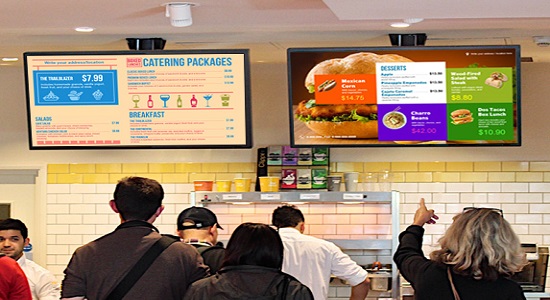
Digital waiter is the new fad: The digital waiter is a voice and AI-driven solution that acts as a waiter and caters to the dining needs of a user. “The digital waiter is a compact hardware powered by ToneTag sound-based tech that is capable of intuitive interactions with the user. For example, when a person takes his/her seat at the table, the digital waiter automatically wakes up and greets the diner. It displays the menu on the diner’s mobile phone and subsequently accepts the order through voice-based commands. The Digital waiter then relays the order to the kitchen and keeps the diner company through smart interactions such as informing about order readiness etc. Once the diner is done with his/her meal, the digital waiter displays the digital bill, which the diner can pay via the in-App feature or using a voice signature. The whole dining journey with the digital waiter is completely personal, contactless, and digital,” said Anil Kumar, CTO, ToneTag by adding that the digital waiter only streamlines and digitizes a diner’s experience which in turn helps the staff manage the restaurant better and serve the diner without any hassle or long wait-time.

With more and more people wanting to open a dark kitchen or a delivery concept, it has become the new go-to model for everyone. And, there’s no denying that dark-kitchen is a food service business but it cannot be a consumer interface business. It can be viable or profitable for the operator if he works on the efficiency of a factory operations- well controlled environment, there is a production cost which is very efficient, and there is shift kind of work culture, no downtime. If you think a dark kitchen business at scale, it can be thought of a FMCG company that knows it clients, USP and area of investment very well.
Who’s the eater of the future?
According to a report by BCG, “Overall online spending in India is rising rapidly and expected to grow at 25% over the next 5 years to reach over $130 Bn. Riding on the wave of rapid digitization and steadily growing consumption, the reach of Food Tech companies has grown six times over the last couple of years and will continue to increase further.”
“The eater of the future remains same as today; it’s just that the frequency of ordering goes up. So, we might see in 2-3 years that customers who are ordering once or twice a week will order once or twice a day. So, that in it will make a 7x growth in their ordering pattern,” said Tushar Anand, Co-Founder, Chefered Foods who believed that in years to come kitchen will slowly become obsolete in a lot of metro cities as people will find it more convenient to order food online.
The convenience factor in the business has upped so much that food comes with a click of a button, it comes in 20 minutes. It’s not the usual fare that we had 5-6 years back where people use to wait for their food when ordered online for at least an hour or so and there were only a small number of players offering delivery at home.
Know your market well
Most of the restaurant fails because they themselves are not sure about the market, their product etc. One has to be very confident with his product if launching it in a city/area.
“We have to understand our catchment very well and closely. Eater of the future might change in tier-I cities, metro city. There is a huge shift happening in tier-2 cities also. But we have to understand our catchment, market very well and we have to invest in understanding what the customer need is. So, it is very important to listen to the customer and then define your product rather than taking a product into the market and waiting for the customer to accept it,” pointed Vineet Manocha, VP- Culinary at Lite Bite Foods that owns some of the top restaurants in India and has entered into the cloud-kitchen space during the pandemic.
Getting the right investment done
Every restaurateur or entrepreneur dream of getting the best investors and funds on boards but it is also important to know what sort of investment you need? What is your USP that will make an investor invest in your brand and also why he should pick you over the other brand? So, if you have all this answer you can reach out to the right set of investors and expand the brand further.
“As investors we are looking at two things in a brand- do you know who your customer is because you are not just competing with the pizza guy but also with everyone who is offering the food in the same price range. Secondly, the USP and why you are doing this and what makes you different, uniqueness in the space- be it a cuisine, target customer or even the price point,” added Nandini Mansinghka, Promoter, Mumbai Angels Network.

Food service business that is largely occupied by retail has been facing lots of pain in last one year. But then we have been moving with some behviourial change, trend and there is lots of data available on how we should move ahead. “There must be some mistakes but then we can learn from it as we move ahead, collated, collected and used it for our benefit in coming times,” shared Celebrity Chef Sanjeev Kapoor. Talking at Dark Kitchen and Delivery Summit, 2021 at Restaurant India he also talked about new trends, menu, behaviourial changes etc: Excerpts from his talk:
It is all about experience: “It was two weeks ago when my daughter came to me and said, dad this is the message I got from a very fancy restaurant and they are giving meals for 1200 per person. This is a five-course meal that you could order.. There was smile on my face because I remember this restaurant was going public that no, we do not deliver food and our food was not good enough if you get it packed and so we wouldn’t deliver. And, now the situation has changed so they are delivering. Again, the offer was offer we order directly from them, website. We did that, but as we started to order, we realized that the website was not really optimized for an I-pad, anyways we had to shift to a laptop and ordered choosing for 8:30 PM delivery, the order was placed at 2 in the afternoon. At 5 Pm, the bell rang and we got the ordered delivered which was placed for 8:30 PM, we called the restaurant asked them, they apologized but when we ate the same food in the evening, the quality was par below, the packaging, the food, everything was below the pricing that was charged. So, the experience was lost and we as a customer would never order from that brand again, also we would think twice before visiting that restaurant because the experience has been bad,” said the Padma Shri awardee by pointing that customer experience is an important part of the food business. It takes just a bad experience and the customer never returns to a barnd/restaurant.
Also Read: Why customer experience will be the new marketing tool for delivery brands
Adopting new changes: Restaurants these days are trying their hands at everything they could. From being the best restaurant, to delivery brand and also testing their hand at opening or entering the dark-kitchen space. They want to get at least some pie in the business for their survival. There’s no denying that restaurant are all doing this to make the fair business, stay relevant and also beer other expenses but we should also know that that’s how we learn thing and uncertainty teaches us new things and learning.
May Interest: “Everything from analog has gone digital in restaurant biz”
Digitistaion is the new normal: The Indian food-tech industry has grown exponentially in the past few years with a proposition anchored around convenience & value. According to a new report by Google and Boston Consulting Group (BCG), the sector is expected to grow at a 25-30% CAGR to become a $8 billion market in the next two years. With the sector growing at such a speedy rate, we also see that the digital consumption of the consumer has increased in last one year. “For restaurant industry, food retail especially. There is a change when payment in cash has come down dramatically, drastically. How do we influence the customer mind, the marketing of our product? It all depends on how people consumer things. The digital consumption has changed that,” added Chef Kapoor.
Hence, we can say that, though we will see more and more new concepts, trends venturing but the core value remains same, food, customer, quality and of course consistency

Why are you looking at automation? Is consistency an issue? Are you aiming at quality or a collective data? It’s important that you priortise these problems and benchmark them before you enter into the world of automation. There’s no denying that with more and more restaurants looking at expanding wings, delivery and technology changing the whole behavior of food ordering and kitchen technology, the whole world is looking at automation and kitchen technology as a much faster way to churn their table.
We all know that autonomous technology and data science has completely changed the customer experience by redefining it to altogether a different level. According to the National Restaurant Association’s 2019 State of the Restaurant Industry, a majority of consumers would like to see restaurants add more technology that improves customer service and makes ordering and payment easier. And, we have seen brands like McDonald’s, Starbucks etc including self ordering kiosks etc at their outlets that are especially located at drive-thrus or are available for a curbside pickups.
And, similarly, we saw this trend picking up in India, now that more and more home grown restaurants and technology players are trying to be the McDonald’s and Domino’s of the world, automation and IOT has played a bigger role.
“IOT, automation and robotic is big intimating words sometime but when someone ask you to associate this with kitchen automation, you probably come back and describe and image of super hi-tech convene or a belt and arm preparing your food but it is such a stereotype that automation as a whole has got this notion of being super complex and extremely capital extensive. Automation doesn’t necessarily is always equal to robotics. Robotics might be a sub set of automation but the way we look at automation is anything that can make our life easier,” believed Sagar Mehta of Knox Innovation that is helping India’s largest cloud-kitchen player Rebel Foods in automating its kitchen by making it simpler and easier.
The food industry has really evolved tremendously across the last decade with technology playing an important role in transforming the way the world consumes food. “Restaurants have also gone through a journey of adaptation to stay relevant. Today, if a restaurant needs to be successful from both a top line and bottom-line perspective, it is critical for them to automate a lot of their internal processes to optimise their operations. With the advent of online ordering whose share of revenue has also increased, customer experience is dependent on a lot more aspects that is beyond just the food taste and quality and leveraging technology and automation is a no brainer for restaurants to become more efficient,” shared Renjith Prahladan of UrbanPiper that help brands like Mainland China, McDonald’s, Eatfit to automate their kitchen and restaurant space.
Commenting on the same, Eshwar K Vikas of Mukunda Foods said, “ So far, Restaurants use to thrive on social gatherings, but pandemics changed how it works. As a result, we can see the shift from dine-in to delivery, and the customers seem to be happy with this change. However, the delivery model also comes with its own set of challenges like aggregators would hardly give you 10-15 mins for meal prep, which puts an additional load on your staff, and you might require hiring skilled staff. Maintaining food consistency also becomes another concern with a high dependency on human intervention. This is where Mukunda's automation solutions help them address these concerns and smoothen their operations.” The brand has automated 14+ processes that can help restaurants maintain consistency, reduce dependency on skilled labor and gain operational efficiency.

In many countries, take out or delivery for restaurants has converted from 5-20% of their business, to now, 80-100% of their business. And hot food delivery has, in the last 6 months, increased user penetration from 20% to 80% of the population. When you factor in generational demographics, this sort of user shift would normally have taken 10-20 years to occur. Handling that level of demand increase in such a short amount of time is not an easy feat, especially for restaurants not designed for the significant reversal of demand and distribution channel, from dine-in to take-out / delivery. “That is where cloud kitchens have risen to meet this demand - and the new normal. What was once an optional consideration for the consumer is now exclusively the only choice,” shared Kent Wu, COO JustKitchen. And even post-COVID, this new modality will be part of the landscape; just as fast food (QSR) became part of the F&B space. And more recently fast casual restaurants, which was the blend of fast but healthier food, has experienced great success. With decreasing rates of cooking at home in our fast paced and busy lives, the pie is getting larger and is being split into ever-more nuanced verticals.
Selecting the best of the menu
Menu design or menu engineering what we may call in the delivery space remains an integral part of the food business. According to researches and reports at global level, menu items or foods like Pizza, Pasta and Salads work very well in the delivery space. Also, talking about Indian markets where north Indian cuisine holds a major chunk of the business, biryani and south Indian foods are most preferred items after pizza. “There’s no denying that Pizza, pasta and salada are top most selling items in delivery but we have our soups that is the highest selling item in our menu and it’s better than fried foods like burgers and fries etc. In general there is a significant part of food category that delivers well,” added Wu who believed that it also depends on packaging and too some extent packaging depends on the geographies and location of players as it works differently at different level.
Why it’s all about Automation
With more and more brands entering into the delivery space serving multi-cuisine from a single kitchen, automation definitely becomes the need of the hour because the more the demand, you will have to match with the need because in online or the delivery space an aggregator generally gives10-15 minutes of the time to prepare a food. Hence, automation comes into the picture. “I had 2-3 QSRs back in 2015-16 and was dreaming to make it the McDonald’s of the food. But from the 5th outlet we were not able to maintain consistency, we had attrition and we have people coming who used to say that the food at your outlet here is good but there is not good. We weren’t making money as we were bootstrapped and we want to make money. And, that’s when me and my co-founder started with a very basic machine called Dosamtic and it came out very well and many restaurants started approaching us asking for the machine as they have the same problem. And that’s how our whole journey of automation started,” shared Eshwar K Vikas, CEO & Co-Founder of Mukunda Foods who is now a major supplier of automated machines to the restaurant and delivery kitchens including the likes of Rebel Foods and Swiggy to name a few.
Customer is the King
"At the end of the day whether it is the dark kitchen or not the central party is the customer and ultimately you have customers who are mostly delivery dependant. Any customer at any point in time is choosing a brand based on what is suiting their needs. Even if there is a customer who is ordering on delivery, there is a brand that the customer is trusting. And, if you say brands it starts with the taste of the food to the packaging it came in. And, back to how and where it was prepare," said Vishal Kapur, COO, North Africa, Alamar Foods that runs Domino's in the region.
Hence, looking at the current scenario, we can say that delivery and dark-kitchen business is here to stay with food, quality and obviously customer being the king in the sector.

Food delivery business has change the way we have been dining and ordering our food at home. From being just a mere option to sit and relax at home, it has become a necessity for everyone to order their favourite food. According to a report, in 2020, the food delivery market reached a value of US$ 4.35 Billion and is estimated to develop a user base of 300.57 Mn by 2024. Here are top trends that will change the meaning of delivery in the restaurant and food business:
Conscious eating will be in: There’s no denying that the new normal will look out for different variety of food brands. There is a sudden change in consumer behaviour, people are now more conscious of what they are eating, where the ingredients are sourced from, who is making their food, etc. It will now be essential to be transparent to the customer in every aspect of the food – from farm to fork.
Also Read: Why customer experience will be the new marketing tool for delivery brands
Rise of ‘The delivery only restaurant’: We see that with restaurants being shut for longer time, more and more restaurants are into delivery and cloud-kitchen space. There is an emergence of ‘delivery-only restaurants’ and it has been expedited because of the current crisis. People may be very selective in terms of which restaurants and crowded places they visit. More people will ‘order in’ for even use cases such as having fun with friends.
It’s all about ‘Trust’: Brand trust has become as important factor as price and variety. Restaurant and food brands that would be able to win the customer’s trust during this period will have an opportunity to create winning brands and have customer loyalty for a long time. “Trust is not restricted to price and variety alone; it also extends to the staff who will be handling the food. It is one of the main reasons, why at Rebel Foods we started sharing the temperature and medical reports of the staff, the ingredients that go into making the food, along with the calorie specifications as well, is to ensure that our customers know the details of all their food,” said Karan Singla, Operations Head- India BU, Rebel Foods.
Packaging is the key: It is one of the most important aspects in a delivery eco-system, as customers are moving more towards ordering food online for delivery, at their door-step. There will be greater emphasis on packaging that is tamper-proof, and spill-proof, as this will instil confidence that the food that has been delivered is safe and also appetizing in spite of having travelled a certain distance.
May Interest: Why Packaging will become mainstream in 2021
The rise of combi-items: Delivery moving forward will have to be focused on creating combinations of your best dishes for solo orders so it caters it specific tastes and preferences
Driven by tech: Technology also plays a crucial role in serving our customers to the best of our abilities while staying in constant touch with them. It plays a significant part in the delivery space and has been helping brands to cater to their customer’s expectations better with every order. Revolutionising the sector and catalysing intensive growth, technology is a game-changer that is now being integrated across several segments of the food industry.

With the pandemic, eating out as a group and celebration with family and friends has drastically reduced. And, hence brands have introduced various home dining experiences, not just bringing meals at the comfort of home but they have also come with accompaniments which provide the ambience of going out and celebrating, while staying at the comfort and safety of homes. According to a recent report by Adobe, “where technology is a gap, brands are taking a broader look at personalisation, evaluating all of the building blocks that support a better experience: data, content, decisioning and delivery. The pandemic has helped teams to understand where they have struggled to bring the experience together.”
“Delivery is no longer a retro-fitted business. The business has evolved so much and you have specialist needs to this category,” shared Joseph Cherian, India Head, Kitchen Plus who started a cloud-kitchen brand himself 5-6 years ago before partnering with Swiggy.
Also Read: How Cloud Kitchen has Emerged as a New Online Vertical
It’s no more about MORE is good: Today the ecosystem in the food delivery is far more evolved in comparison to few years back. These days’ brands just need to focus on quality. “In dark kitchen you can spend your money on operations, efficiency, people, detail understanding and flexibility of the menu etc. But in an offline world if you have to change the menu the cost is huge, you have to change a lot of collateral, communications. It’s much easier in terms of quickly change in dark-kitchen and delivery space,” added Cherian by pointing that data is available wherein you have an understanding of the consumer. So, how do you leverage all of that and quickly adapt and make these changes is easier at the delivery front.
Getting the right transaction: The emergence of ‘delivery-only restaurants’ has been expedited because of the current crisis. The global cloud kitchen market size was valued at $43.1 billion in 2019, and is estimated to reach $71.4 billion by 2027 with a CAGR of 12.0% from 2021 to 2027, as per reports. People may be very selective in terms of which restaurants and crowded places they visit in years to come but delivery is definitely going to change the whole gamut of dining-in trend. “Delivery and dark kitchen business looks very appealing as everyone knows that it is low capex, quick on return business. We at Wendy’s took almost 2 years to decide on it. It may look fun initially but it’s all about the mass and getting the volume,” shared Jasper Reid, Founder, IMM that runs Wendy’s, Jamie’s India by adding that the bottom line is about getting the transactions.
It’s all about optimisation: With delivery model soaring, an entirely new model as we may call it dark kitchen/ cloud-kitchen has emerged. In comparison to the delivery business, dark kitchen is much optimized business. “Earlier for most of the dine-in centric outlet delivery was only 3-5 per cent of the business. So, you didn’t optimize. People need to understand that delivery is one of the core business today and as restaurant sale has increase to 60-65 per cent from an average 5% per cent today is all because your optimisation has moved to such pace,” said Rakesh Ranjan, Chief Sales Officer, Zomato.
The right menu engineering: “The biggest mistake that a restaurant do when they enter into delivery or a cloud-kitchen business is that they put in the same fine-dining menu that they have online. Restaurants need to think here differently because the same customer might behave very differently when he comes online verses when he visits a restaurant for a dine-in experience. Hence, a nuance approach in menu engineering is very helpful,” pointed Renjith Prahladan of UrbanPiper as online business is all about making yourself visible to the right customer. And, with more restaurants and start-ups looking at online availability and visibility, aggregators are also trying to fix on how they would give space to each of these restaurants.
Must Read: Covid-19 has made most restaurant kitchen a dark kitchen, Is Brand Trust Next
The better ‘For You’ space: The consumption pattern has change in last 2-3 years wherein people are looking at healthy options that has both health and entertainment attached to it. We see that calorie counting foods, chef-driven menus, immunity booster ingredients are also high on demand in all these years. “Based on our internal data 35% per cent of our customers that are on subscription basis, half of which would have a goal attached to it whether it is weight loss, diabetes, heart conditions etc. I think that number continues to hold as we look at completely new kind of customers seeking more entertainment. I think the whole concept and awareness about health has gone few notches up and it’s now about goal-based approach. Health food is important and it will complete to improve in years to come," concluded Ankit Nagorio of Eatfit who has completely changed the health food spectrum in the country.

Technology in restaurants has come a long way. From a simple cash register to a central point of control for all functioning, technology has made a quantum jump. In the restaurant area, there are multiple spaces where technology plays an important role, one of the most crucial ones being restaurant operations.
Now, let’s get the fact understandable that there are a lot of things that an owner must look into. The types of Restaurant operations start from getting the high standard ingredient from the right vendor, ensuring that the kitchen never runs out of stock, checking if all the employees are tirelessly performing their tasks are just a few to start with.
How to Grasp Technology to Streamline Restaurant Operations
Technology streamlines your end-to-end restaurant operations and helps you deliver compatible customer service. The restaurant requires quality ingredients, with freshness and nutrition value being key desired attributes which in-turn affects the quality of dish which Chef is making. Indoor smart garden technology offers Chefs access to fresh and healthy ingredients which increases the overall quality of dishes served. Read below and gather the knowledge about how using technology productively can help you in streamlining restaurant operations:
1. Hassle free Order Taking
You must maximize the growth of cloud technology to support your restaurant operations. A point of sale software that is browser-based and can work easily on any hardware such as a laptop, tablet, even a Smartphone enables Hassle-free order-taking mobile ordering, table reservations, automatic loyalty rewards, and taking orders from outdoor diners. Various food reservation apps are creating the task of table reservations very easy for both the customers and the restaurants.
2. Improved Front-end Operations
There are a lot of daily tasks that need to be done on the front end to ensure that you have Hassle-free operations in the day ahead. The several ways by which technology can smooth your front end restaurant operations are:
• Technology can enable your restaurant staff to provide wonderful guest service. Based on the order history of the customer, the staff can advise and upsell items.
• Self-ordering stands are making news nowadays that let customers order food themselves without the help of a waiter to take their orders.
• Digital menu boards are also an alluring way to display your menu items quickly.
3. Greater Efficiency in Kitchen Operations
The food which is the soul of your restaurant is prepared in the backend. This raises the importance of having operations at the back-end on the mark. The time consumed to prepare a dish, the inventory, the menu, the generation of kitchen waste, cleaning and hygiene, all need to be checked always, and it will now be made easier with the help of technology.
• A Kitchen Display System is an essential part of the restaurant kitchen operations. The Kitchen Order Ticketing (KOT) goes to the separate food-prep station directly, and the approximate delivery time becomes more accurate. Proper communications improve the customer experience and reduce the scope of mistakes on the part of the kitchen staff.
• Executive chefs or kitchen managers can easily make menus and generate food costs for standard or special-order items
• Keeping a check on inventory becomes simple with a restaurant management POS. The software sends you real-time alerts whenever an item gets to its reorder level. This makes sure that you never order an item that is already available or your kitchen runs out of an essential item in a busy hour of the day.

No one would have ever thought that the concept that would get started as a small budget option would be a global trend in few year. Today, cloud-kitchen or ghost kitchen/ dark kitchen what we may call the model, is projected to become a $2 billion industry in India by 2024, according to RedSeer Management Consulting.

In the last five years, we have seen brands like Freshmenu, Rebel Foods, Box8, Biryani by Kilo, Cross Border Kitchens, Goila Butter Chicken, InnerChef and many more disrupting the space like never before. In fact, restaurant brands like Speciality Restaurant Group, Lite Bite Foods, Azure Hospitality, Foodlink that has lured the diners for more than a decade now have ventured into the cloud-kitchen space to take a bite of the already flourishing segment and also to overcome the coronavirus losses. With restaurants almost shut for 8-9 months, cloud-kitchen model came as a savior for many food businesses.
Also Read: How Rebel Foods has Built the Largest Dark-Kitchen Business in India
Cloud kitchens have disrupted the food industry the same way Netflix did forhome entertainmentor what Uber did to the traditional taxi industry. “Traditionally, the food industry has seen large QSR chains opening huge restaurants where customers would come and dine-in. For a food business, this model is high on overheads and not very profitable, especially in countries such as India which have very high rent-to-sales ratio. This is where cloud kitchens disrupt the market of food services,” shared Karan Singla, Head of Operations, India.
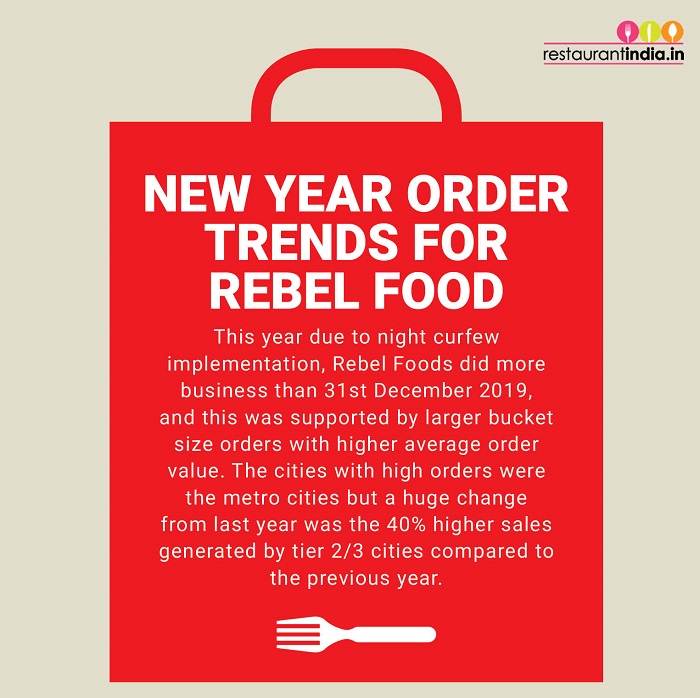
Cloud kitchens enable to save a lot in terms of revenue, but they also enable multiple brands to operate within a centralised system. The pandemic saw a lot of the brick-and-mortar restaurant brands shut down, and pave way for the cloud kitchen brands. With multiple restaurants entering the delivery space, a completely new universe of option opened for the consumers to choose from, giving them an all-new experience, at the comfort of their home.
“With the trend of “ordering out” we realized that delivery was slowly becoming the real king. Considering the same we started to convert some of our ‘dine in’ kitchens to ‘delivery kitchens’, said Anjan Chatterjee who launched 3 cloud-kitchens during the pandemic with plans to add 26 more in coming months.
Low on capex, high on returns
2020 has been a year of surprises and the era of new trends being born. One of them is the introduction of cloud kitchens which is definitely here to stay. Another form of it that already existed was home deliveries from restaurants. The best part about cloud kitchens is that it has given the small players a chance to enter and test the market. The cloud kitchen model has various pros that work best in the industry's favour. For example, Swiggy and Zomato didn't play a big role earlier in the hospitality industry but have now become significant platforms for the growth and visibility of cloud kitchens. Cloud kitchens have lower operations costs along with saving a lot of money as you don't invest in large premises which is definitely profitable than a restaurant. In a nutshell, because of their low-cost maintenance and broader reach via online visibility, they are far profitable than restaurants.
“In terms of driving factors, I believe that cloud kitchens have lesser break-even time and fewer inventories. Although, the exposure to your clientele is almost the same as factors like social media, delivery portals, etc. help in reaching out to your customers and be visible. Not only it is a smaller and easier approach but is also a lucrative business strategy compared to starting a restaurant that takes up to 4-5 years to break-even,” pointed Rahul Bajaj, Director and Conceptualizer at One Tight Wrap.
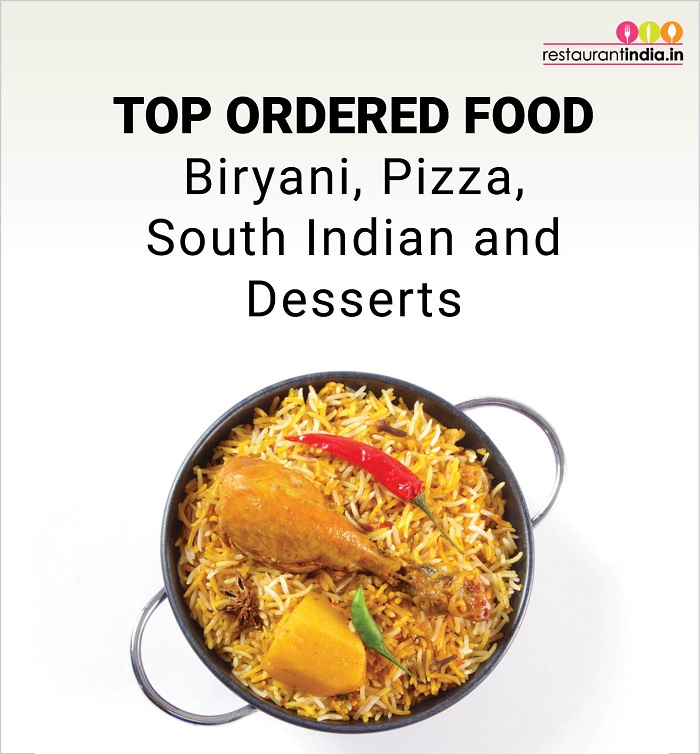
May Interest: 7 Reasons Why Cloud Kitchen
Packaging is the new storefront
“Packaging is becoming the new storefront. People love visiting new restaurants and share their opinions on the interiors, ambience, and customer experience. With social distancing, in-store experiences have taken a backseat and food packaging becomes the new customer touch-point,” added Singla who believed that people will take note of great packaging experience, share it on social media making it a good conversation starter.
Also, it’s not just about packaging, a safe packaging is also a major concern for people these days. The Masala Story from the house of Punjabi by Nature uses packaging that serves as a sustainable approach to the environment. Catering to hygiene and safety guidelines, The Masala Story didn’t fold and had to sacrifice some of the energy and character that had defined them in order to operate safely during the ongoing pandemic. The delivery kitchen adds additional sanitary and social distancing requirements like checking temperature, sanitising the kitchen etc. similarly, Rebel Foods has introduced – ‘UV sure bag’. Food which is ordered on any of the Rebel Foods brands will be put in an outer bag, which is run through a UV chamber, deployed at all partner kitchens, before being handed over to the delivery person. The UV chamber disinfects both the outer and inner surfaces of the bags making sure that it’s completely safe.
It’s a global boom
“In many countries, take out or delivery for restaurants has converted from 5-20% of their business, to now, 80-100% of their business. And hot food delivery has, in the last 6 months, increased user penetration from 20% to 80% of the population. When you factor in generational demographics, this sort of user shift would normally have taken 10-20 years to occur. Handling that level of demand increase in such a short amount of time is not an easy feat, especially for restaurants not designed for the significant reversal of demand and distribution channel, from dine-in to take-out / delivery,” shared Kent Wu, COO of Taiwan-based JustKitchen that has grown to 40 per cent month-on-month in just ten months of starting its business.
Backed by the customer support, the segment heavily relies and works on internal feedbacks, loops and interactions as it believed that customer feedback plays a huge part in the success and accomplishing product market fit.
“We're proud to state that 30% of our customers provide feedback and 99.5% of it is positive. We have huge customer loyalty and ultimately, they make us the success we are today,” added Wu of JustKitchen that has decided to go public on TSX Venture Exchange.
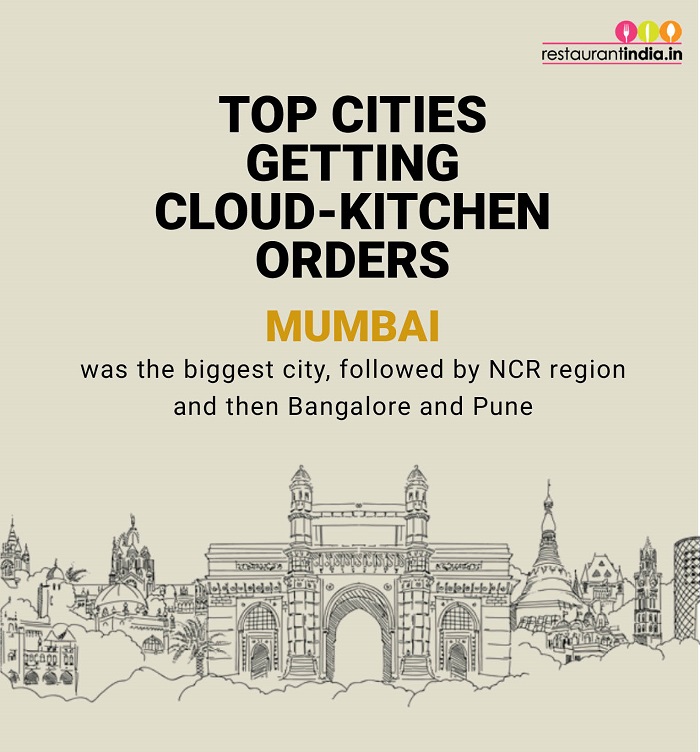
Similarly, Dubai-based Kitopi that is currently present in the UAE, Saudi Arabia and Kuwait markets, is now operating more than 60 satellite kitchens with more than 1,200 partner restaurants. Also, to cater to the growing online needs, Kitopi launched an e-grocery business by launching ‘Shop Kitopi’ in Dubai last March.
It has also partnered with Kuwait-based KLC Virtual Restaurants for expanding KLC in GCC region last week.
“Our mission is to satisfy the world’s appetite, and partnering with KLC brings us one step closer to achieving that mission,” said Mohamad Ballout, CEO and co-founder of Kitopi by adding that they achieve this by taking care of the operations – such as sourcing of ingredients, cooking, packaging – and also delivery by partnering with third-party aggregators.
Hence, we can say that with all the numbers and attentions that the cloud kitchens have lately garnered, as consumers have been forced to turn to online for food delivery due to the pandemic-induced lockdowns and movement restrictions, it is surely going to rule the food sector for quite some time.
Looking at the trend, we at Restaurant India are doing the first-ever dark kitchen and delivery summit and awards on 20th May 2021. The virtual-conference will gather top players from India and global markets discussing and debating about the segment and its growth story, demand, consumer trend and why it's important for brands to look into delivery not just as an option but as a necessity today. For more details please visit: www.restaurantindia.in

Maharashtra Govt on Tuesday announced new protocols and guidelines asking all restaurants and bars to close for dine-ins , except for those inside the campus and which form integral parts of hotels.
However, home delivery services are allowed and there shall be no visiting any restaurant and bar for ordering purposes or pickup.
Also Read: Mumbai to now order food from their favourite restaurants 24x7
“Restaurants and bars inside hotels are to be open for in-house guests. In no circumstances shall outside guests be allowed. For outsiders, they will follow the same restrictions as any other restaurants and bars as mentioned above. Guests of the hotels may move out only for the valid reasons or for performance of duty required for essential services or for exceptions made for offices in the order,” the statement mentioned.
The government has also asked people involved in home delivery services to be vaccinated at the earliest as per GOI guidelines.
"We truly honour the decision considering the current situation. The industry is going to face the worst if this is extended. A large number of restaurants are already closed and at the verge of closure. We wish strict and vigorous actions against the protocol defaulters are taken and also improve the vaccine drive at its best to get rid of this pandemic at the earliest,” said Aji Nair - COO - Mirah Hospitality (The Company that owns and operates Bayroute, Hitchki & Rajdhani chain of restaurants).
It has stated that home deliveries to buildings housing more than one family should be restricted to the entrance of the building and internal movement of delivery should be by dedicated staff of the building. “It is also expected that all the interactions of home delivery staff and the building personnel are disciplined and COVID appropriate,” it added.
May Interest: Pune Restaurants protest in support of hospitality business
Any default in COVID appropriate behavior will attract a fine of Rs 1000 on the offender and fine of Rs 10000 will be levied on the establishment. Repeated offence may lead to withdrawal of licenses and permissions for operations till notification for COVID 19 epidemic remains in force, mentioned the statement.
The government also announced that all staffs working in these restaurants and bars are advised to get vaccinated at the earliest, as per GOI guidelines, so that reopening of these may be expedited.

It seems like having a Déjà vu! Partial lockdowns, night curfews, limited seating capacity and the second wave of the pandemic has once again halted the meaningful recovery that the restaurant industry was witnessing. Just in a span of one month since the Covid spike, food businesses in metros are already down by as much as 50 to 70 percent. The beleaguering industry has lost all hopes.
In fresh curbs announced in the various states, it is being anticipated that another round of closures is to hit the industry by the end of the month. This will turn the majority of restaurant business unviable, at least for smaller players. However, with the delivery and takeaways being allowed, should restaurants learn from past experience? Can the delivery model be a saviour in the second wave?
Also Read: How Lending Platforms are Helping Cloud Kitchen Biz Grow
Today because of the pandemic, online ordering has become a way of life and backbone for many physical restaurants. Food deliveries by platforms such as Swiggy and Zomato are growing at a 50 percent compound annual growth rate (CAGR), while deliveries by marketplaces such as Flipkart and Amazon are growing at 63 percent CAGR, the highest among all e-commerce segments.
Offline players taking online route
“Last year, during unlock, we saw the delivery of F&B coming under essential services. Since then, the F&B industry has evolved with a heavier focus on hygiene towards no-contact deliveries. If the alarming second wave does result in lockdowns, the delivery model will be the saviour to everyone,” shared Ashwin Mocherla, Co-Founder of TTSF.
Expanding via cloud kitchens has become a great way for offline players. The industry veterans of dine-in concepts like Zorawar Kalra, Riyaaz Amlani, Anjan Chatterjee, all announced their cloud kitchen platforms last year, tapping into the growing demand. Not just the restaurateurs, but hospitality giants like ITC Hotels and Taj Hotels too ventured into the cloud kitchen segment, even investors couldn’t keep themselves away by putting their money into the segment.
Amid the Covid-19 pandemic, food delivery platform Swiggy has witnessed a 30 percent growth in orders for food delivery. According to the platform, the top three cities that saw maximum orders during match days were Bengaluru, Mumbai and Chennai. The top five tier 2 cities that performed well when it comes to food ordering were Lucknow, Guwahati, Indore, Surat and Ahmedabad.
The rise in digital payments and the country moving towards digitisation has also been a catalyst for fueling this growth. According to a report released by ACI Worldwide, more than 70.3 billion real-time payments transactions were processed globally in 2020, a surge of 41 per cent compared to the previous year.
Cannot rely completely
However, restaurateurs fear that one cannot rely completely on online delivery. Rahul Seth, Co-Founder at Burger Singh commented, “It's definitely not the only recovery model. Unfortunately, the past year has forced a lot of individual restaurants to shut shop. The food market aggregators tell us there has been as much as a 30 to 40 percent reduction in supply. While this is really unfortunate for the restaurants that have shut down, it has left a huge open market for chains like us that thrived because of our lean business model.”
While tweaking of business models is imperative, one cannot run away from the fixed operating expenses like rentals, utility expenses and salaries, which usually is huge and cannot be fulfilled only through online orders.
May Interest: How to market your cloud kitchen business
With online food ordering demand growing at a high CAGR and the cloud kitchen model enabling faster expansion with cheaper resources, it is definitely going to be one of the biggest trends we shall witness but we cannot put the responsibility of complete revival onto its fragile shoulders.

In the current state of the global pandemic, the online delivery business has seen such an outgrowing growth. According to the latest food delivery statistics, it is one of the fastest-growing industries. This doesn’t come as a surprise, as food delivery is convenient, saves time, and helps in avoiding unnecessary social interaction.
The food delivery business gaining popularity in such a short period of time has given a boost to the subscription-based model. Subscription-based or meal kit delivery services are one of the newer additions to the food delivery industry capturing a decent share of the overall business. According to Statista, the meal kit industry was valued at $4.65 billion in 2017. The very next year it blew up with a 300 percent increase. Estimates for 2022 are that the market will reach $11.6 billion globally.
Also Read: Why subscription based model is biggest disruptor of today's delivery trend
First and foremost, a subscription means added convenience for the customer. In India, the idea of meal subscription is an age-old concept. We always had dabbawalas, delivering fresh homemade meals to the office goers or the students. Taking it one notch up, now we have a number of subscription meal services that deliver fresh, healthy meals to the doorstep and even customize them to one’s specific dietary needs. FoodDarzi, Healthie, GourmetBox, Masalabox, EatFit are some of the market players in India.
“It is true that as the pandemic hit the nation, the F&B operators adopted various ways to stay afloat and survive the crisis efficiently. In my opinion, meal subscription plans have definitely been an interesting initiative that we saw from several restaurateurs,” said Mihir Mehta, A Mumbai-based Investment Banker at Ashika Capital stated who has successfully executed transactions In the F&B space in India amidst Covid-19.
What does it mean for the business owners?
Once the customer places an order, the likelihood of ordering again from the same place is very much higher in the case of a subscription. When volumes are compared, the revenue generated by the subscriptions is way more than a single business transaction. A subscription model can also provide a good cash flow for the business. Instead of an estimate, the owner can be fairly accurate and expect the amount he/she will have in hand.
A subscription-based food delivery model can be feasible due to the low investment cost involved. Also, it comes with high operational efficiency due to fixed orders. Moreover, one can easily lower down the delivery cost if the number of orders is pre-confirmed for each day.
“The demand is definitely on the rise because people have become more health-conscious. They want to eat and stay healthy and hence choose products and brands that guarantee health, fitness, and safety,” shared Sakshi Bakshi, Founder of Nucros Science & Taste. She also informed that through the subscription model, the company has saved on inventory and logistics resulting in an increase in profit share.
While their meal subscription plan is available only in Delhi/NCR right now, Bakshi’s future plans include expansion in PAN India with subscribers across the country.
Apt for present consumer need
With time and technology, the need for customer-centric and sustainable models has grown drastically. Today, users want a meal plan personalized to their dietary needs and in quantity enough for one-time consumption to avoid any food wastage.
“For a successful subscription-based business model, it is very important for a provider to consider cost-effective measures of every customer as it differs drastically with every order,” said Aditya Bafna, founder of Nashik-based Nutridock Kitchens.
Nutridock, a healthy subscription-based as well as food delivery start-up, has announced its expansion plans with an aim of opening 50 stores/kitchens by 2022 to offer sustainable and accessible meal plans to a wider audience.
The on-demand food industry runs on the premises of sustainability and cost-effectiveness and only those adhering to the two norms can make it in the long-term. Over time, subscription models have proven to be feasible in the long run as there is less anticipation and there are no redundant processes involved since every order is pre-planned.
Hurdles to overcome
However, for Mehta, the potentiality of meal subscription plans is debatable. “There are elements like high price sensitivity (since it is a recurring expense for the customer), limited menu engineering, streamlined logistics, low margin high volume strategy, etc. that ideally determine the success of this model,” he added.
To make meal subscription plans a sustainable business vertical, it is pertinent to work and overcome the above-mentioned challenges and that is a daunting task to integrate with the DNA of an already established restaurant business. “This was also witnessed during the pandemic as multiple restaurateurs struggled to metamorphose this initiative into a full-blown business,” Mehta informed.
May Interest: Food delivery platform Swiggy revamps 'SUPER' subscription service
With a strong IT backend, it becomes imperative to keep track of the enormous data generated by the customers that can be used to make better marketing plans, monitor buying preferences, and run promotional campaigns.

The restaurant industry in India for a long had been following the traditional way of doing business until the global pandemic stirred things up. Tight margins, low sales and rapidly changing markets demanded restaurants to do something different to get profits back on track.
In order to stay afloat, restaurants across the country took the aid of technology to create a better customer experience, hygiene and safety, increased sales, and improved operations. To allow guests to order and pay for food without a physical exchange of employees, most chains and independent restaurants upgraded their digital systems and back-end. Standing at the forefront was the concept of no-touch ordering and payment methods, largely driven by QR codes in the form of digital menus.
Also Read: Is QR Ordering Solution Future of Restaurants post Covid
According to the estimates from the PRIME (POSist Restaurant Industry & Market Evolution) Report, nearly one-third of restaurants in India are actively using QR code ordering technology since the Covid-19 hit. It has been further speculated that 80 per cent of restaurants in the country will adopt QR codes and other online ordering technologies by the end of 2021.
“Contactless dining tools such as QR codes, touchless payment options, and digital receipts help restaurants maintain basic hygiene as well as optimize their resources,” said Ashish Tulsian, Co-founder, POSist who believed that QR code technology has remained an underrated technology to connect and transact in India.
Adopting QR-based technology
In terms of the restaurant’s digital presence, QR codes can easily be implemented across the front of the restaurant, website and social channels. This makes the operation seamless for the customers in terms of adding themselves to a virtual waitlist, booking future reservations, checking out menus before dining in or ordering right away without waiting for the waiter.
“The digital menu acted as a saviour for us during the pandemic. We introduced the QR code menu as a safety measure in July and luckily, our customers and staff appreciated given the circumstances. We have realised that along with providing safety, the digital menu has helped us stay professional and has made us more efficient, all while saving paper,” pointed Tenzin Thardoe, Founder and Director of Ama Café.
QR code features are highly customisable which comes as an advantage for a restaurant. One can personalise the look and feel and edit the menu as frequent as possible. QR codes can also be used to market more products to customers. For instance, a diner orders today’s special, which only consists of an appetizer and main course. Since the process is digital, restaurants can choose to up sell other food items which may eventually help boost sales and profits.
“While these menus allow guests to only remain in contact with their personal gadgets, from an operations perspective we can constantly add items that are more seasonal in nature that allows us to keep us with the ethos of seasonal tastes,” added Amanpreet Matharu, Director Food and Beverages, The Westin Gurgaon, New Delhi.
Dishes that are not available cannot be efficiently removed from the physical paper menu and becomes a costly affair to re-print everything. However, through the QR menu, the list can be updated with complete efficiency at any time, instantly, and without the customer noticing it.
“Guests at my restaurant prefer a digital menu over paper menu books. In the age where everything is coming online then why not menus," commented Jeewan Kwatra - Founder and Owner, Bob's Den Café.
Hence, we say that the technological revolution that started out of the fear of virus spread is here to stay as not just the owners but the customers also like the idea of it.
Edited By: Nusra

World is getting techsavvy so why don’t your food!
Virtual kitchen, ghost kitchen, the dark kitchen is all the synonym of cloud kitchen. Restaurants are turning online, the facility of ordering and delivering food through food aggregator apps or through the restaurant’s own app.
Concept of Cloud Kitchen
“Technology is best when it brings people together.”
It creates a rainbow when it brings food to people similar rainbow is created by a cloud kitchen.The idea of a cloud kitchen emerges with the arms spread of technology in our modern life of the techy world. Travis Kalanick invented the cloud kitchen. It allows customers as well as restaurateurs to fulfill their wishes by swiping a single key. Customers can place their orders over the internet through their choice of the portal and the food is instantly prepared and gets delivered at their place at your customized or comfortable time.
Time is unstoppable but cloud kitchen is a massive help to walk with time, in time, and beforetime. In the busy world, we want everything at our pace and time. The cloud-based technology system gives us a sigh relief by fulfilling our wish like genie. It is simply one stop to pamper your hunger with scrumptious delicacies in no time.
7 Reasons Why Cloud Kitchen?
It reduces expenses and need not spend on establishments; it can work efficiently in minimal infrastructure with low starts-up costs. It prevents petrol-high rental payment hassles. From age-old restaurants to naïve restaurateurs are welcoming cloud kitchen with smiles to add techy stars with their quality and services.
1. Towering OPs- It inflates the Operating Profits (OPs), by opening the doors which minimize the set-up worries, unlike traditional restaurants. Plus, it opens the window of extra profit by saving overhead costs such as administrative costs and maintenance utilities.
2. Savings in Capital Expenditure- It reduces the fever of rental issues and the only thing about which the one should concern is that your modest, hygienic kitchen is established near to consumers.
3. Less time consuming- Through this tech advancement, customer demand can be handled easily and restaurateurs have more diversification, options, manners, services to pamper their customers.
4. Quality Service- It helps in maintaining quality with quantity. It not only helps in making customers happy but also satisfied.
5. Dive in choices- It helps in analyzing the preference, taste and pulse of customers to innovate and improve services.
6. Just a swipe away- It took as much time as we took in blinking eyes, super easy to explore, experiment, and customized menu online according to your tongue.
7. Standardized Delivery Procedure- The standardized delivery procedure makes it more trustworthy and convenient.
Predictions – Cloud Kitchen soon at zenith
Cloud Kitchen is not only trendy but also the convenient and time saving.
1. On decrease in setup costs, cloud kitchen will evolve faster and better.
2. Full kitchens in some arena will become a thing of past.
3. The focus of restaurateurs is going to face positive shift in terms of efficiency and experience.
4. Cloud kitchen franchises will be a cupcake treat to start up.
Cloud Kitchen: Business Model
1. Classic Model- This model focuses on consumers comfort at low cost. No tangible dining space or seating establishments.
2. Kitchen Umbrella Model- This model contains multiple brands under one mother kitchen umbrella. Consumers will have multiple cuisine at one stop.
3. All in One Model- As the name suggest it is a mix of both the afore- mentioned models. It includes multiple brands under one roof and customers will have numerous cuisine choices.
4. Garnish Model- This model consist of restaurants can rent the space and rest of the thing will be done by online delivery platform. This model ensures quality food.
Conclusion
Cloud Kitchen does have lesser hassles and provides quality, quantity and customized scheme to customers as per their tongue and pockets.

We have seen an absurd increase in the food delivery business in the last six months. With people sitting at home, ordering food at home has become a trend, pushing even the top industry leaders venturing into the delivery, dark-kitchen business. Brand like Lite Bite Foods, Speciality Restaurants, Bercos etc have already joined the cloud-kitchen race competing with the likes of Freshmenu, Rebel Foods and the likes.
What was appealing?
“In 2014 when we started the business, there were lots of on-demand apps that were coming across the world. Also, in India everybody had a smart phone. So, there was a clear idea that everyone can order from their phone. Similarly, on the QSR side we have seen that lots of brands in India have tried to become the Domino’s, McDonald’s and Yum! Brands of the world but high street rentals, labour cost which only keeps growing etc were some of the hurdles and the physical model have seen all ups and downs. So, we were working on a model wherein you get money from the customer but do not incur the rental cost. And, we were trying to avoid the rentals. Cloud-kitchen was not even the word then when we started Freshmenu,” shared Rashmi Daga, Founder, Freshmenu that is the pioneer of dark-kitchen business in India way back in 2014.
Also Read: How Swiggy Access has mastered the Dark Kitchens Business Model
Delivering for growth
The food delivery industry has shown stronger signs of recovery. It continues to grow back steadily to pre-COVID levels, with the overall sector clocking ~85%+ of pre-COVID GMV (Gross Merchandise Value), up from ~75%+ last month,” shared a Zomato blog in September.
“The food delivery business has grown in last six months for sure but for us it is recovery rather than growth. The industry has grown from March where we saw the business was shrunk to 10% to 20% of GMV but we have come back on track not just at Zomato but the industry in general,” said Rakesh Ranjan, Chief Sales Officer, Zomato. Not only this, there is high offline to online contribution during evening. “If we say in February the dark kitchen was at 40% of the new supply, today it is at 55%. So, there is a 15% increase but it is largely coming from establishments themselves who is looking at expanding or large establishments who are looking to convert their kitchens in to dark kitchen,” he added.
Bringing experience at home
One of the major issues that delivery joints have been experiencing in the past is about creating restaurant like experience at home. But with everyone venturing into the segment and more and more people preferring to order food at the comfort of home this has even become easier for players during the pandemic.
“One of the challenges that we see in dark-kitchen business verses restaurant is the number of boxes you do in the same time. I am running a dark-kitchen on biryani which is doing extremely well during the pandemic. Pizza, Biryani and dosa are some of the most ordered item while placing an order online through an aggregator or directly from a dark kitchen brand,” added Chef Koushik Shankar.
May Interest: ‘Ghar ka Khana’ is go- to food for Dark Kitchen Biz

With the upliftment of lockdown and surge of cases in India, businesses have reopened, and people have resumed their daily life. At this point, the priority should be to look out for business solutions to serve customers better and safe.
The Food & Beverage industry mainly, Restaurants, Hotels, Bars, Cafes, and others, were facing declines as they had to be in-direct contact with the customers and the staff members while taking manual orders, passing tickets to the kitchen, and physical bill payments. Hence, they have opted for contactless restaurant management solutions- the most acknowledged technology of all times during this pandemic.
Also Read: Restaurant trends customer would adopt post pandemic
The transformation from offline to online has not only helped the Restaurants, Hotels, Bars & Cafes to maintain a social distance but also ensured accuracy and efficiency in business execution.
For instance, cloud-based technology infrastructure like eatOs which is built exclusively for restaurants of all sizes has the ability to simplify operations, improve guest experience, save costs, and engage with the community in new and innovative ways.
Features such as Inventory Management, Single Click Bulk Product upload & Lookup, Table Management & Reservation, Auto Kitchen ticket, Secure Remote Web Access, Barcode Scanning, Customised Comprehensive Reports, Multiple Contactless Payment Options, User Accounts & Permission, Customer Facing Display, Promotion, Customer Management, User-friendly Dashboard and Integrated Solution with delivery partners has proved to be the need of the hours.
May Interest: How This paging technology has helped restaurants during COVID times
Let us understand a few more features in details which are helping the restaurant, cafes, hotels, etc to grow business further-
Menu Management-Whether your menu is twenty items or two hundred, POS solution like eatOS makes menu management simple. It helps build menus for specific service times, special occasions, and happy hours as well.
Order at Table-Software solutions like orderOS allows your customers to Order Online, Order via Mobile App, Order and Pay at Table touchless using QR Code driven menus and payment options.
Omni Payments-It allows customers to pay however they want either through digital wallets or UPI enabled Apps. That way you won't miss out on any customers.
Scheduling & Payroll- It helps to manage every aspect of your employee's work experience. It reduces your workload by scheduling shifts, calculating accounts, and issuing payrolls.
Digital Ordering- This feature allows you to accept online orders for your on-the-go customers so you can be prepared to serve whoever, whenever, easily without any physical contact.
Reporting & Analytics- It helps to get real-time data of your restaurant’s performance from anywhere on any device at the restaurant or the go. The Cloud-based data includes product mix, menu analytics, labor data, daily sales, voids & other operating reports all in one place.
Pay-at-Table- It is a safe and easy way of accepting payments via customer's mobile phones. It speeds up the payment process by bringing easy to use QR code-driven payment application to the table.
Multi-user environment- It helps to keep your employees in sync with multi-user technology, strengthen your team, share information seamlessly, and facilitate restaurant operations in real-time. Employees can access the system from any device anywhere.
Thus investing in a cloud-based POS system will provide access to growth and development opportunities while helping you expand your business and customer base.

As the disruptive effects of this pandemic slowly but steadily subside, we are witnessing the restaurant industry rise out of the ashes like a phoenix. While there are many reasons like the adoption of hygiene measures, contactless dining technology to thank for the quick turnaround, one cannot deny the contribution of takeaway as a business model in reviving the industry.
One of the best attributes of a takeaway business is that it can be adopted by restaurants with dine-in facilities and cloud kitchens alike. And there cannot be a more suitable time for a restaurateur to dive into this business model. Consumers are already opting for takeaway food services to spice up their dull lives.
Also Read: Restaurant-tech platform Dineout launches Takeaway services with restaurants
Pivoting of restaurant business models
In India, takeaway & drive-throughs were around 1% of the overall organised restaurant industry as compared to 15% to 20% in the US and European market during the Pre-COVID days. Over the next six months, it is expected to go up to 15%. According to a report by the RedSeer Management Consulting, the Indian appetite for takeaway food services is projected to be a $2 billion industry by 2024.
Jubilant Food, which holds the master franchise for Domino's Pizza in India, Nepal, Sri Lanka and Bangladesh, reported 56% year over year growth in Takeaway during their Q1 Earnings call.
The key enabler of an efficient takeaway & drive-through food service is technology. Takeaway business possesses very little scope for error as the diners are focused solely on the food quality. The icing on the cake is that diners can pre-order their meals that further reduces the wait-time. inresto is making this possible for major malls across the country.
One such brand taking this business model to new heights is DLF Cyberhub. Restaurants present on the property have partnered with inresto to innovate their services and cater to the diners new needs. These diners mostly comprise of families, couples and small groups of friends experiencing the locked-down fatigue. They drive in, scan the QR code at the entrance that gives them access to the digital menu, place their order and quickly collect their order from the pick-up point.
Takeaway: The Knight in the shining armor
Five-star hotels delivering food at your doorstep, an unheard concept, is a stark reality today. For the longest time, the Indian restaurant industry played it safe. Sticking to the basics about 75% of the organised restaurants operated with the Dine-in model and very few dabbled with home delivery and Takeaway. But at present, they have an opportunity to hit a home run.
May Interest: KFC introduces contactless takeaway to ensure customer safety
Numbers never lie. A CGA Peach report pointed out that in 2019, more than 50 per cent of the adult population in Britain had their food delivered to their doorstep. That's about 28.6 million people. Restaurants across the world have started acknowledging the increasing appetite for home delivery and takeaway, while Dine-in picks up a steady pace. This change in behaviour has a significant impact on the market and indicates faster recovery.
Future of the restaurant sector in India
When we ponder upon the future of the F&B industry, we must stop first to assess the needs of the consumers. Is this a need that they can do without for a long time or give up altogether? The answer is no. Human beings are social creatures. It’s in their DNA to communicate and partake in social events and gatherings. So as long as we are humans, we cannot do without the F&B industry. It is important to have a positive outlook. As lockdown subsides and life starts resembling some normalcy, we see diners stepping out for leisure. And that’s the promising sign here. There still is a need for good times, just with an added layer of safety.
This has been made possible by the premium hygiene standards and contactless dining technology at restaurants. Our end to end contactless dining product suite enables these restaurants to remove non-essential human interaction, thereby making it safe for diners as well as staff. While the dine-in model is rallying ahead steadily, other business models like takeaway are proving their mettle as diners look for a variety of food services options. The valuable insight here is that diners have reached a saturation point with respect to home-cooked food and are looking for restaurants to cater to their needs. It is now upon restaurateurs to recognise this and take immediate action.

It’s as if most of us have even forgotten the pre-COVID-19 times when socializing and meeting friends and family was absolutely normal. We used to wait for weekends to make those short trips or just while away the entire evening over cocktails and chats. Those days are gone now and no one knows for how long. The pandemic has definitely put a long pause to our normalcy and all we can do right now is to accept the new normal and change things accordingly.
The pandemic already has and will continue to bring an irrecoverable loss for the hospitality industry. It has put the whole world under complete lockdowns. Governments were forced to impose strict restrictions for our battle against the virus. Though we are still fighting the virus, the process of unlocking is at the rise and we are all working together in cooperation to get the businesses in line again.
Must Read: "Contactless dining is here to stay", says Sanjay Mahtani of Hard Rock cafe
Adopting the #Newnormal
The hospitality industry has taken a huge hit due to coronavirus and continues to remain in loss. The virus has made the entire F&B industry suffer as these places had to be shut down. While we are all putting our best efforts to make things as safe and clean for all the customers, it is never going to be the same for a while even with 100x efforts. The industry is and will go through a ginormous transformation and is going to face numerous challenges along the way. The processes are going to change and demand a system that can help the people achieve their goal of social distancing while they enjoy outside.
Though people are all set to continue with the new normal, it requires a great deal of effort and insistence to get the customers again and make them feel comfortable and safe. The post-corona era is changing the way we looked at things and it is bringing with it a modern way of dining in.
We, now, need advanced technical support to keep people socially distanced while they enjoy their time with their loved ones outside without the fear. The millennial generation thrives on socializing and hence its modernization was necessary. Apps with an AI-enabled Self-checkout system aimed at enabling a contactless and queue less process for the easy functioning of business processes is the need of the hour. These apps are digital and come with a dynamic system that uses a QR mechanism to make the ordering and payment contact-free, feasible, and user-friendly. People are working day in & day out to make these apps the next generation engagement platform for retail & food places where buyers can level up their experiences & business can get better opportunities to sell.
Taking a contactless route
In the last few years, contactless technology has made great progress due to the increasing popularity of smartphones. Contact-Less is now a reality that is about to transform consumers' daily activities such as ordering, paying for purchases in retail. This new technology will immensely become successful post lockdown, due to social distancing, hygiene, infection spread. Such technological integration in the system is moving with a clear approach to convenience. This means that they are not forcing anyone, instead, the aim is to create an organic necessity for the product.
The millennial generation is highly dependent on their smartphones and technology-driven devices and now the AI-supported dining-in experience will only act as an extension. From where I see, now onwards, the priority of every customer while stepping out from their house would be to lounge at a place that focuses highly on hygiene and minimal contact. While restaurants are working at half capacities to maintain hygiene, with the integration of technology, they can minimize physical contact and prevent the chances of community spread.
Also Read: Why QR based ordering is the perfect solution for restaurants during the new normal
When the customer knows that a certain restaurant is taking care of the minimum touch points and giving the same service then people will want to come and eat. So self-checkout platforms are the need of the hour, especially for the hospitality industry. The plus point of these apps is not just they let you order digitally but also gives you a safe payment passage. This helps in preventing waiting time, queues, and unnecessary contact as well. They are beneficial for customers as well as restaurants that partner with such apps.
The restaurants that use the apps can get all their orders digitally directly into the kitchens, where the food is prepared. Once the order is served, the payment will directly reach the restaurant's account.
This is not only fast-forwarding the entire process but is working as an attractive element for restaurants to get better footfall.

Covid-19 pandemic has made every other restaurant venturing into online delivery space. We see that even though dining rooms are open people are more comfortable in dining at home.
According to a latest report by the food delivery major Zomato alone has delivered over 70 mn orders, with 200 mn orders expected to be delivered across food delivery aggregators. The food delivery platform also mentioned that it has recovered 70-80% of the pre-covid sales.
Similarly, more and more restaurants are venturing into the delivery space, all thanks to the Dining out industry in India is yet to bounce back and operating at 8-10% of pre-COVID levels.
Also Read: 40% of restaurants may shut permanently: Survey
“Everyone wants to go out and eat as they are tired of sitting at home, some people are just delaying their outings and waiting for things to get better. There is a big surge on weekends of footfall at our restaurants as it’s growing every weekend,’ shared Amit Bagga, Co-Founder, Daryaganj who is also planning to launch a QSR brand to cater to the budget customer.
The reasons for these spikes are obvious. Consumers staying close to home amid the pandemic have flocked to delivery. Strong desire of the patrons or simply consumers, which obviously includes all of us, to avoid contact with other potentially contaminated individuals that could be other guests in a restaurant or mall, the service personnel at the restaurant or third parties during the transport from home to the restaurant and back.
“The ease of ordering online from the comfort of one’s own home which eliminates both above risks, but which comes at the cost of missing the experiential part of “dining” out is one of the reason people are ordering more,” added Kazem Samandari, Chairman, L’opera who has seen a massive increase in delivery orders as compared to the same period last year.
May Interest: How this French-bakery chain has approached to the Covid-19 situation
Also, delivery is not everyone’s preferred choice and not everyone can afford it, the country has been facing economical slowdown, unemployment remains in the double-digit.
Despite all this delivery players, restaurant owners and experts have been adamant that people are getting used to the convenience of getting food delivered at home- and the costs.
“Delivery is here to stay as all good establishments that didn’t deliver earlier are delivering now giving the best quality options for delivery it will make sure the fly by night operators in the delivery segment will go out who don’t care about quality and safety,” Bagga further added.
Restaurant majors also predicted and believed that consumer demand for delivery will continue to grow at a fast pace.
“I guess that the sustainable percentage of the restaurant delivery business over time, and once the pandemic has subsided and controlled, will probably amount to 35% - 40% of its peak during the pandemic once things settle down and people find their way back to restaurants and cafés,” Samandari pointed by adding that in the month of July, L’Opéra fulfilled some 9,500 orders of which nearly 900 or 10% were deliveries, however, in terms of value the deliveries represented over 23% of our revenues. In other words, the average value of home delivery orders fulfilled by L’Opéra was two and half times of that of the transactions in the outlets.
Thus, we can say that the future of restaurants consists in a hybrid, so-called “click and mortar” model with technology and other elements playing an increasingly crucial role in the future.

President Digital Business, India Transact Services Limited Aug 18, 2020 / 13 MIN READ
While fear of COVID-19 kept people away from restaurants for a long time, gradually people have started feeling comfortable eating out. However, it will be long before normalcy is completely restored.
A new normal in which people practise social distancing and are concerned about hygiene is here to stay. For restaurants, this presents some challenges but also many brings forth opportunities. Restaurants that can adapt to the new normal will have an edge over those that don’t. A technology that will help restaurants thrive in the new normal is QR based ordering.
Challenges restaurants face today
For quick-service restaurants (QSRs), the peak hours are between 12:00 pm to 3:00 pm, and 7:30 pm to 10:00 pm. During this time, customers line up at counters to order meals and long queues are usually formed at the counter. Impatient and hungry customers prefer ordering food from eateries where lines are shorter rather than waiting in long queues.
Also Read: Sheraton Brigade Gateway to reopen their doors, replaces menu with QR codes
For QSRs, this is a big problem. While they have the kitchen capacity to meet the demands of every potential customer, they lose a considerable number of customers due to long queues. Generally, most QSRs are located in areas where there are many other options for customers. To increase their revenue and retain their customers, QSRs need to find a way to serve every potential customer.
QSRs face other challenges as well. The staffs in restaurants are trained to upsell items like meal packs with an aim to increase the bill value. Despite being instructed to do so, the staff either hesitate or can’t convince the customers to order more. This means such restaurants earn less than they could.
QR based ordering is the perfect solution to these problems. Here’s why.
QR based ordering the perfect solution
A QR based ordering system lets customers pay directly from their table. Customers are saved from the hassle of having to stand in a long queue. As a result, potential customers don’t see long queues forming before counters and feel encouraged to enter the restaurants. With a QR based table ordering system in place, customers can decidewhat to order from their table itself. They can pay for it using their phone.
Must Read: Is QR Ordering Solution Future of Restaurants post Covid
A QR based ordering system works very efficiently. When customers enter a QSR, they sit at their table and scan the QR code placed before them. After scanning the QR code, they see a menu and prices of various items. They go ahead and choose items from the menu easily.
A QR based ordering system also recommends meal combinations to increase the bill value increasing the probability of higher bill values.
Advantages of a QR based system in new normal
A QSR that uses a QR based ordering system keeps contact between customers and the staff at a minimum. Customers appreciate this more since their chances of contracting COVID-19 are low when person to person contact is limited.
Another massive advantage of using QR codes is that restaurants can process more customers. Every QSR that uses a QR based ordering system can utilize its capacity to the fullest more easily because customers no longer need to stand in queues before finding a table. Instead, customers directly sit at a table which increases the likelihood that the restaurant is filled to optimum capacity.
QR based ordering systems time has arrived
Over the past few months, people have grown accustomed to paying for products and services using apps and QR codes. Hence, they are comfortable with such technologies. When customers see a QR code on a table in a QSR, they intuitively know what they need to do. Such is the degree of familiarity people have developed with QR codes. Also, customers recognise that a QR based ordering system is secure. The comfort of using their own app and phone for payments using QR codes is another advantage.
Restaurants that opt to embrace this technology don’t need to invest in expensive tablets and screens that make self-ordering possible. Besides, as QR based ordering is entirely software-based, businesses don't incur any capital expenditure when they transition to a QR based ordering system.
The new normal will take a little getting used to but people and businesses that can make the transition to the new normal quickly will have much more to gain. They will be ahead in the curve when it comes to giving customers the kind of experiences they want. For QSRs, QR based ordering systems are at the heart of providing a safe and convenient experience that customers desire in the new normal.
Copyright © 2009 - 2025 Restaurant India.






